In 2025, the PROUT AT WORK Foundation presented the Queer Network Awards to committed networkers for the eighth time. On the evening of the first day of the conference, a total of four networks were honoured in the categories Big Impact Initiative, Rising Star, Global Leader Network and Sustainability.
The Winners of the Queer Network Awards 2025
BIG IMPACT INITIATIVE AWARD:
pride at munich re
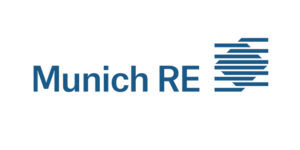
This year, the Pride at Munich Re employee network is receiving the award in the BIG IMPACT INITIATIVE category. The network launched the initiative ‘Column of Voices – BREAKING NEWS’. A homemade advertising column with self-designed posters drew attention to polarisation in society and the role of language and the media. As part of an exhibition, supplemented by an accompanying book, visitors were encouraged to think critically about the way they consume and share information. The initiative was rounded off by a TOGATHERING with PROUT AT WORK with the aim of promoting dialogue and developing approaches to overcoming social polarisation. The focus was on building bridges and strengthening mutual understanding.
RISING STAR AWARD:
bunt@dwd

The BUNT@DWD network of the German Weather Service is being awarded the RISING STAR Award this year. The network implemented a social media campaign during this year’s Pride season that achieved a very wide reach – even outside the queer community. Under the title ‘CSD Weather’, the network published a weather forecast for the CSDs in major German cities on all of the German Weather Service’s social media channels one day before the parade. This enabled the network to reach people who previously had little contact with Christopher Street Day or queer issues in general.
GLOBAL LEADER NETWORK AWARD:
global ing rainbow lions
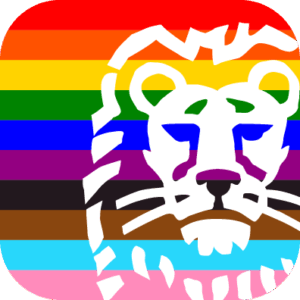
The GLOBAL LEADER NETWORK Award recognises the Global ING Rainbow Lions network, which is currently active in 23 countries, including Australia, Singapore, the Philippines, Germany, the Netherlands, Poland, the United States and many more. The network reaches over 86% of employees worldwide, which corresponds to more than 54,000 colleagues. At the heart of the global structure is the Network Board, which was established over two years ago. It brings together representatives from each local network to coordinate efforts, share best practices and amplify collective impact. This year, a two-day global conference was held in Warsaw, where 14 local networks from around the world met to discuss the future of queer inclusion in the company.
sustainability AWARD:
out pfizer employee network (open)

OPEN, Pfizer Germany’s LGBTIQ+ network, has been honoured with the SUSTAINABILITY Award from the PROUT AT WORK Foundation. With Pride@Work Awareness Sessions, sharing personal stories on Coming Out Day, and creative formats such as queer gaming after-work events, the network has been creating emotional connections and low-threshold opportunities for conversation for almost a decade. As part of the Pfizer DE&I team, OPEN is an integral part of the onboarding process for new employees. Senior leaders also show great appreciation and are actively involved. The focus is on promoting a working environment in which all employees can be themselves and develop their full potential.
The PROUT AT WORK campaign day for companies, organizations, and institutions entered its fourth round in 2024. A good 50 campaigns and events were submitted during the six-week campaign period to show support for equal opportunities for queer people in the workplace under the motto “Show Your True Colors”.
In recent years, PRIDE DAY GERMANY has established itself as a fixture in the calendars of many companies and organizations. In 2024, the campaign day entered its fourth round and impressively demonstrated how important and effective the commitment to queer diversity and equal opportunities is. With a variety of campaigns, events, and initiatives, PRIDE DAY GERMANY sent a strong signal for a colorful corporate world and equal opportunities for all – regardless of a person’s sexual orientation or gender identity.
Show Your True Colors
Under the motto “Show Your True Colors” we succeeded in sending a widely visible message of diversity. A special highlight of this year’s motto was the campaign of the same name. The result of a collaboration with the TV show “Glow Up” we had access to exceptional portrait photos taken by star photographer Armin Morbach. The impressive portraits were displayed on a large scale in the subway stations of Munich, Hamburg, Berlin, and Cologne, as well as during Pride Week in Cologne. This brought the idea behind the motto to the public: every person should be able to live freely, confidently, and visibly.





Copyright: Armin Morbach
Campaigns and highlights: #WeMeanPride
The centerpiece of PRIDE DAY GERMANY 2024 was the diverse range of activities and events that took place over a six-week period. The campaign period began in early June and culminated in the official PRIDE DAY GERMANY on July 4. Under the hashtags #WeMeanPride and #ShowYourTrueColors, the PROUT AT WORK Foundation called on companies, organizations, and institutions to submit their events and thus make their commitment visible.
With almost 50 campaigns, a new record was set in 2024. The range of measures was impressive:
- Workshops and training courses: Companies offered training courses on topics such as queer-inclusive language, anti-bias, and intersectional approaches to diversity work.
- Creative activities: From rainbow-colored building lighting to art exhibitions and Pride running events, there were no limits to creativity.
- Digital formats: Livestreams, podcasts, and digital Pride talks offered employees the opportunity to participate, regardless of their location.
Each action helped raise awareness of queer issues, break down barriers, and advance the dialogue on queer inclusion.
Successful PRIDE DAY CONTEST 2024
Another highlight of PRIDE DAY GERMANY was the PRIDE DAY CONTEST, which once again attracted a large number of participants this year. Companies and organizations were able to submit their campaigns to the contest and ultimately secure a place among the three audience favorites in an open public vote. The winners of the PRIDE DAY CONTEST proved that commitment can not only inspire, but also bring about tangible change.
In 2024, the public vote was only one part of the contest. We highlighted the audience favorites on social media, where they had the opportunity to comment on their campaign with a quote. We also selected three best practices from the submitted campaigns and presented them to the audience at the PROUT AT WORK conference 2024 with lead partner OTTO. This time, special attention was paid to highlighting different levels and formats of commitment to queer diversity. From the public sector, to an outstanding collaboration between diversity management and networking, to an initiative that placed a special focus on strengthening the queer network internally.
An outlook: The future of queer diversity
PRIDE DAY GERMANY 2024 showed once again that diversity and inclusion in a corporate context do not have to be a matter of goodwill. Diversity and the strategic handling of it are core elements of every corporate culture and an indispensable part of a company’s own future viability.
Especially in times when this fact seems to be up for debate again, it is not only about the visibility of actions, but also about sustainability and profound change in corporate structures. Initiatives such as PRIDE DAY GERMANY are not just a day of action, but an impetus for long-term commitment.
Follow us on Social Media!
Instagram: https://www.instagram.com/proutatwork/
LinkedIn: https://www.linkedin.com/company/proutatwork/
On the 13th German Diversity Day organised by Charta der Vielfalt e.V., the PROUT AT WORK Foundation is joining forces with 13 companies to make it clear that diversity remains – despite restrictions against diversity, equity and inclusion (DEI) in companies.
The #DiversityBleibt campaign launched by the PROUT AT WORK Foundation is in favour of diversity, equity and inclusion (DEI) in companies – despite current developments that restrict diversity in the workplace.
This development against DEI programmes and initiatives is a clear step backwards – both for queer employees and for the economic success of companies. Studies clearly show this:
- The more diversity management measures are implemented in the workplace, the more openly employees deal with their gender or sexual identity at work.¹
- The more open respondents are (or can be), the higher their job satisfaction, the stronger their commitment to the organisation and the more convinced they are that they are making a valuable contribution at work.¹
- European companies with mixed teams are over 60 per cent more likely to be more profitable than average.²
- Companies with a high level of gender diversity are 25% more likely to be more profitable than average (in 2014, the figure was 15%). If we consider the factor of ethnic diversity (internationality of the board of directors), this value is even 36%.³
Companies make it clear: We stand up for diversity in the world of work
Together with 13 companies, the PROUT AT WORK foundation is sending out a clear signal in favour of diversity in the world of work. The following companies have joined the #DiversityBleibt social media campaign, which is published on the social networks LinkedIn, Instagram and Facebook: Audi, Beiersdorf, Campana & Schott, Edelman, NORD/LB, NTT DATA, OTTO, R+V, Randstad, REWE Group, Roland Berger, Solaris and Vinci Energies.
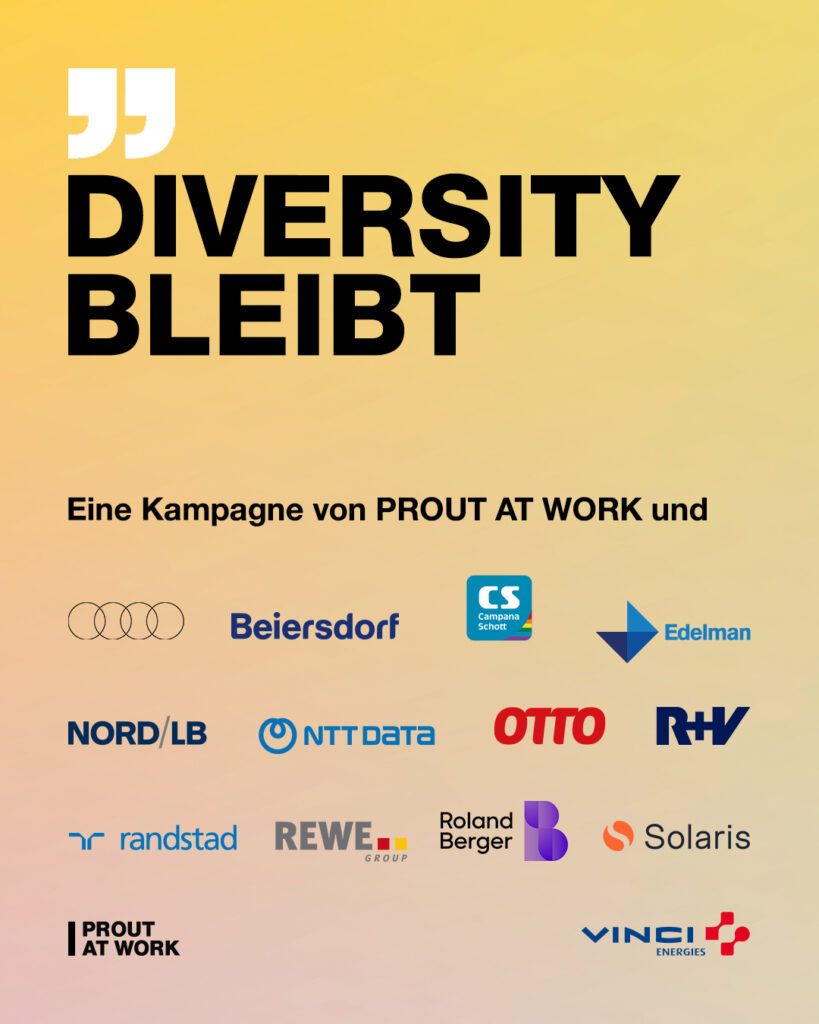
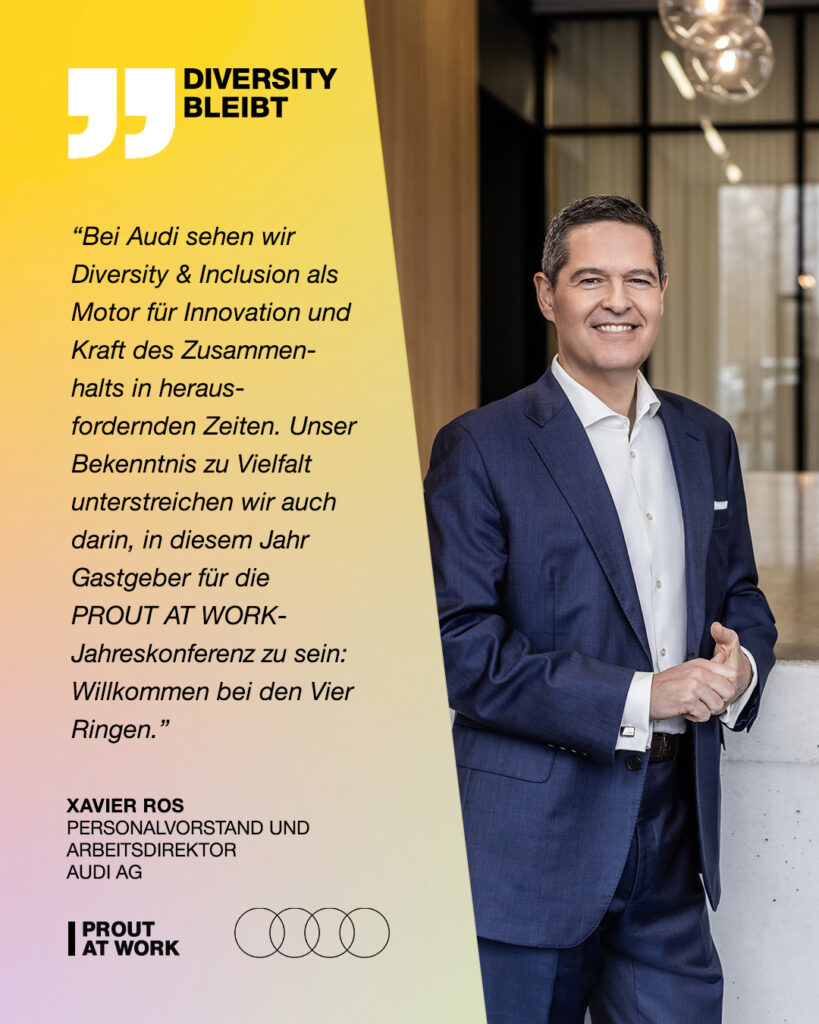
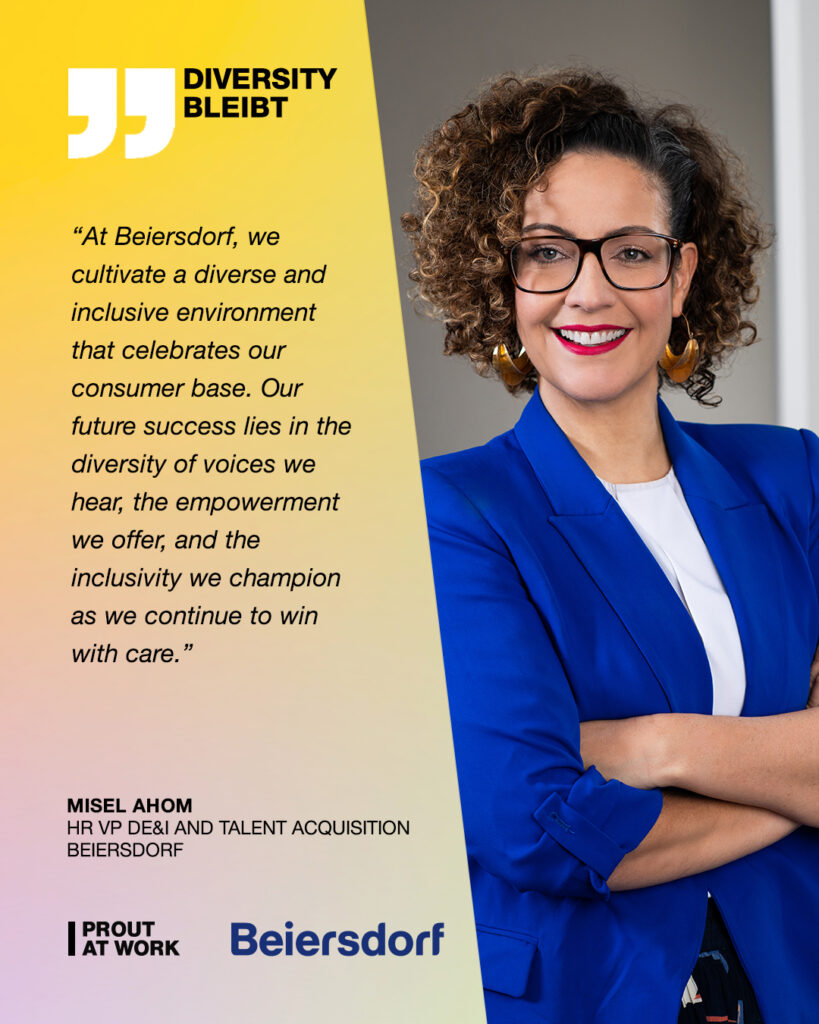
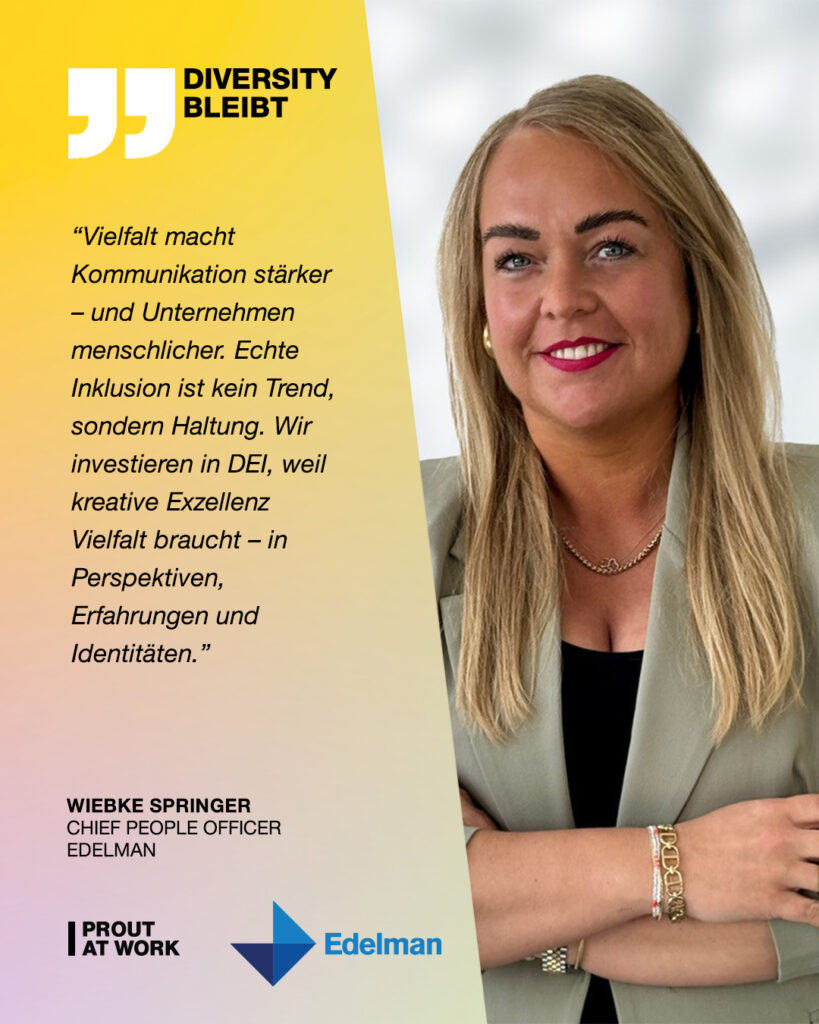
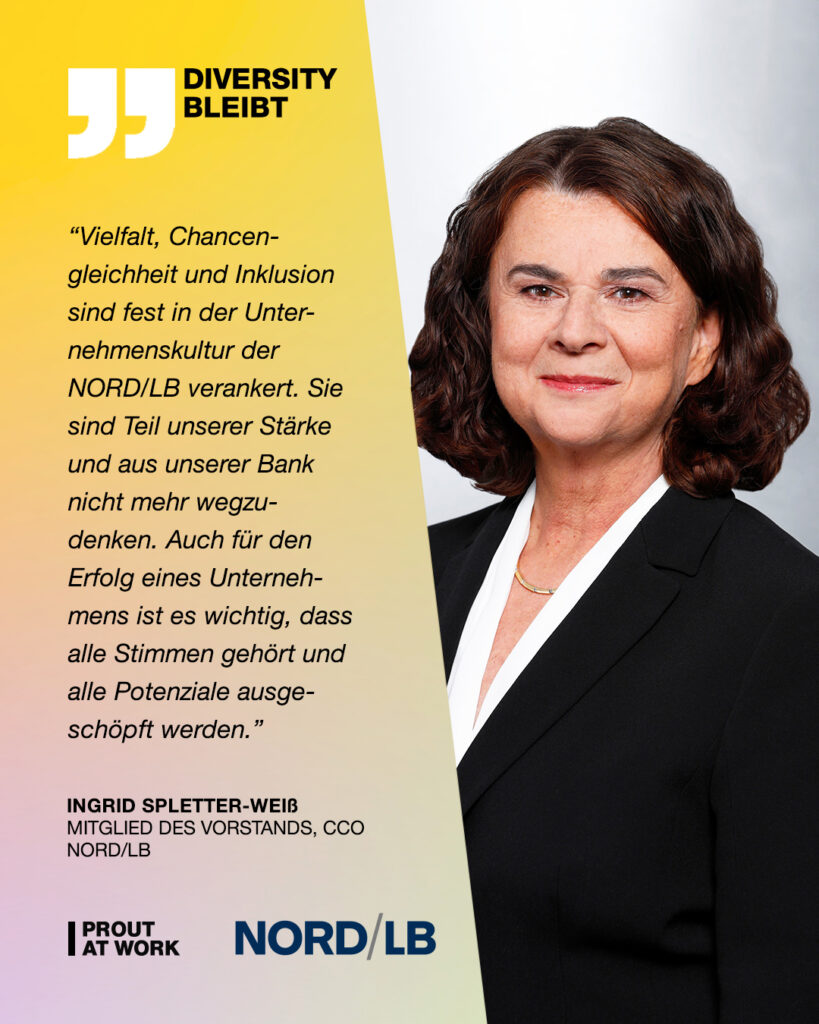
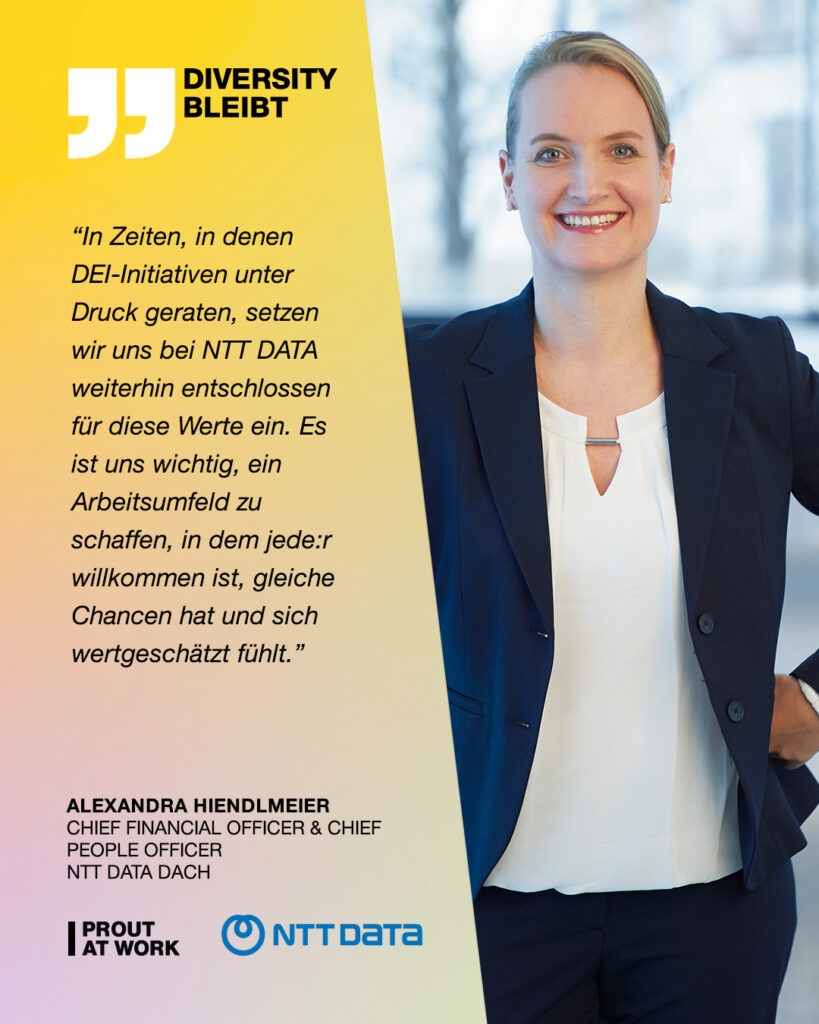
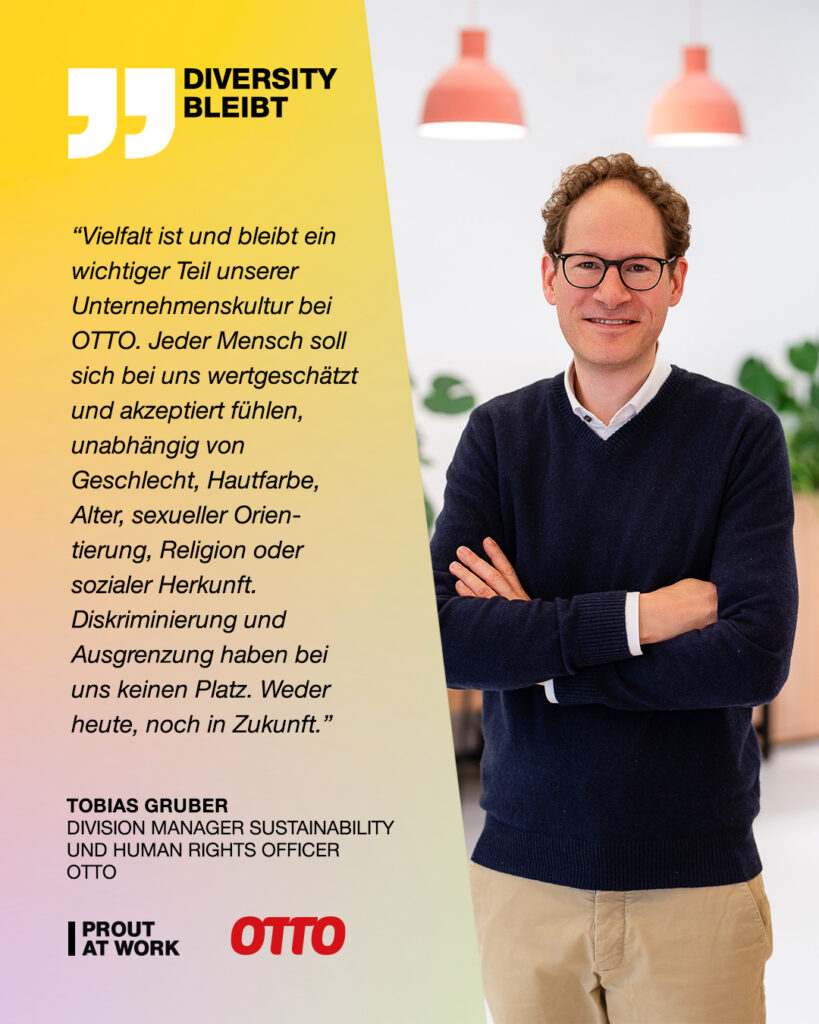
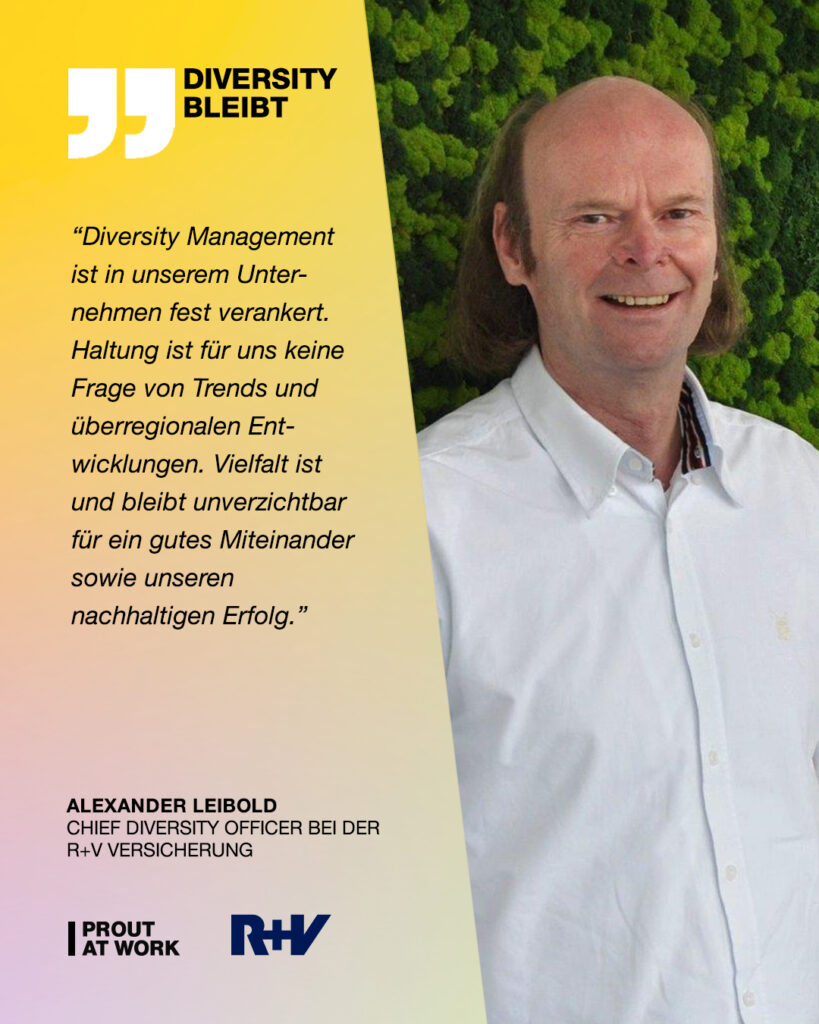
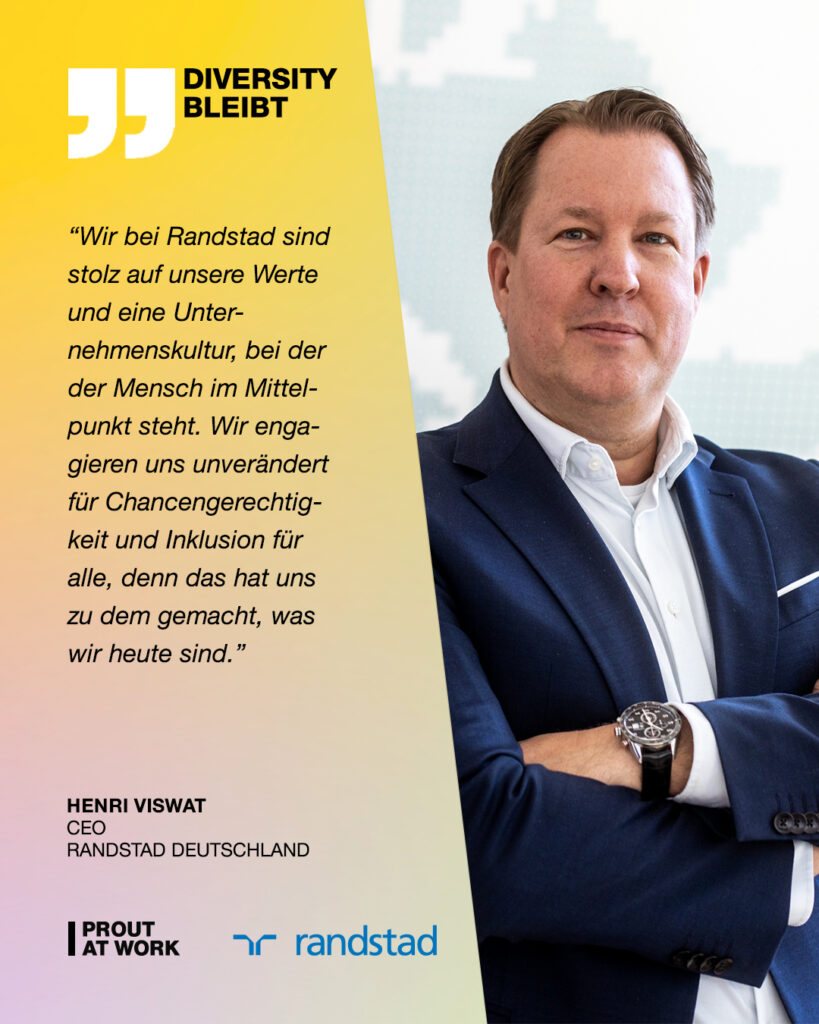
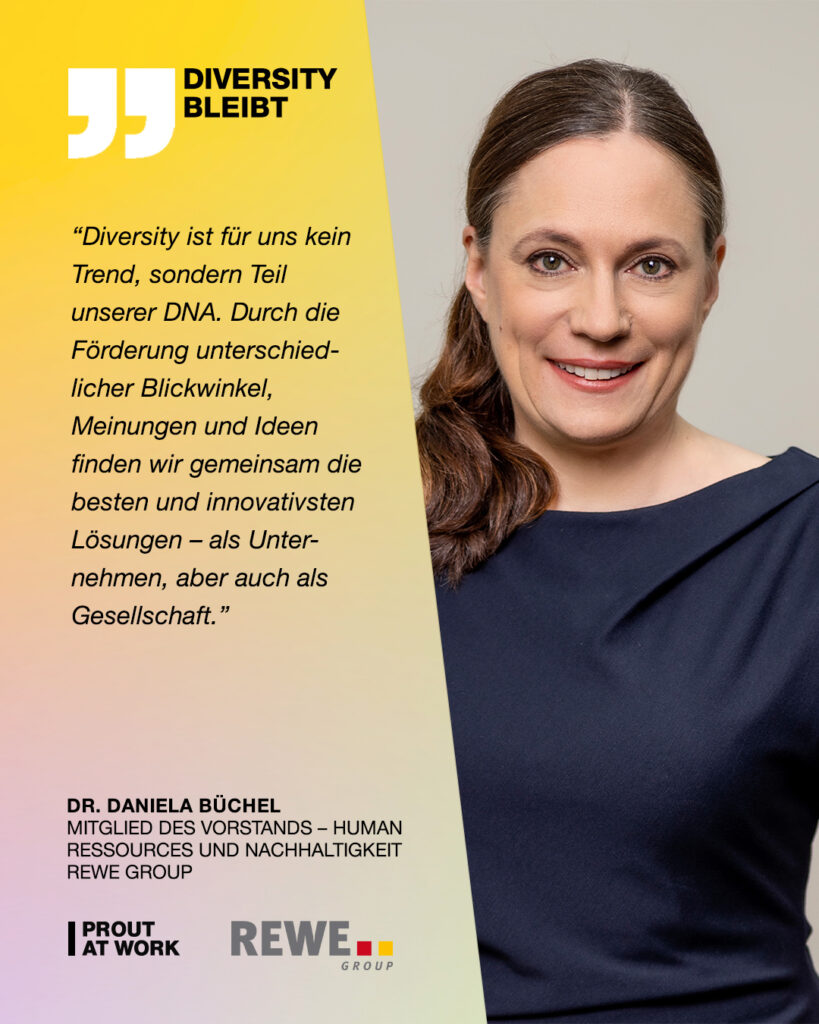
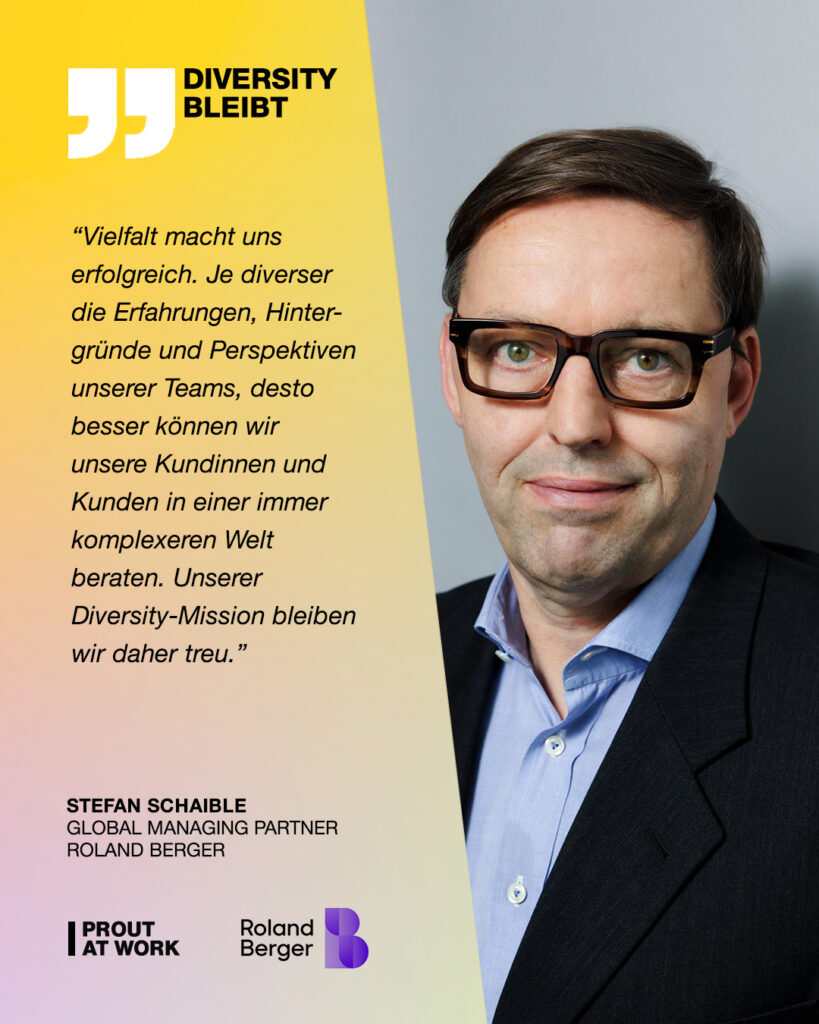
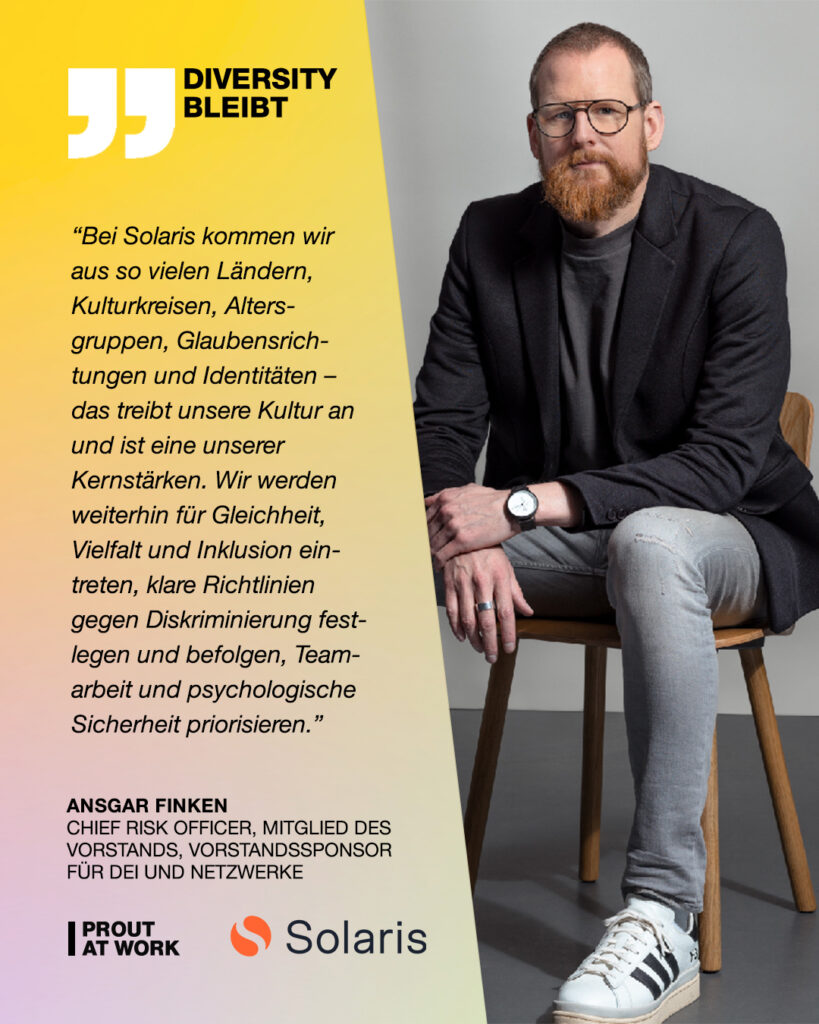
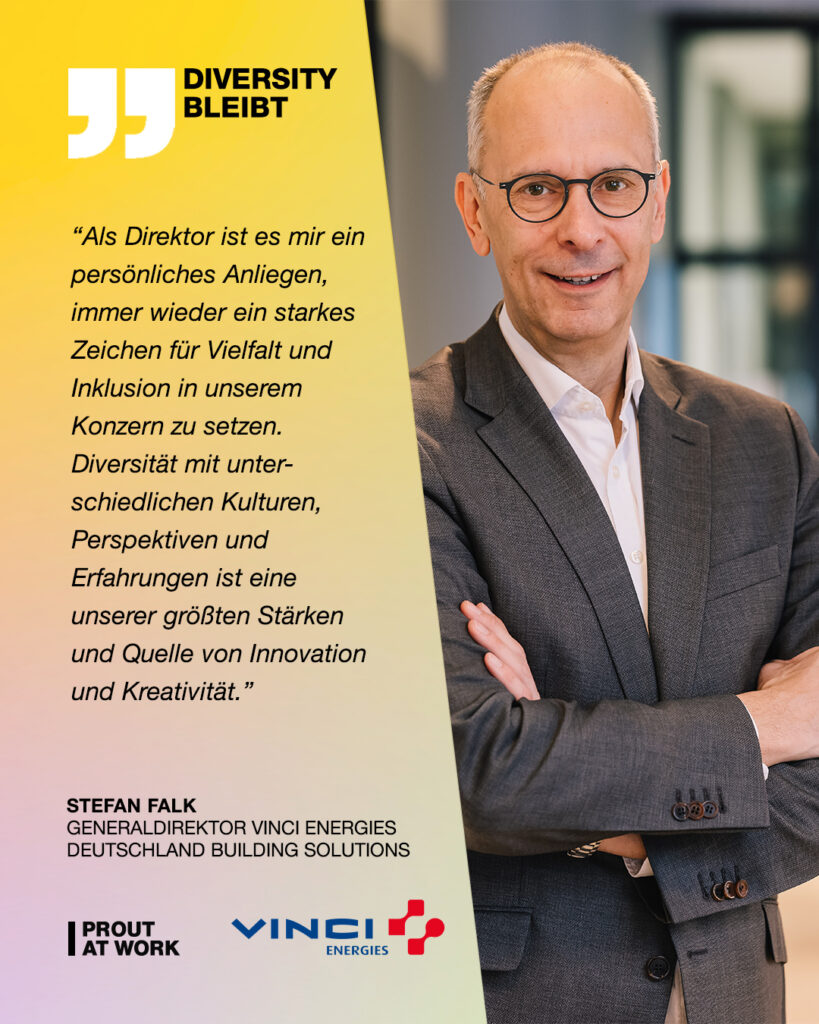
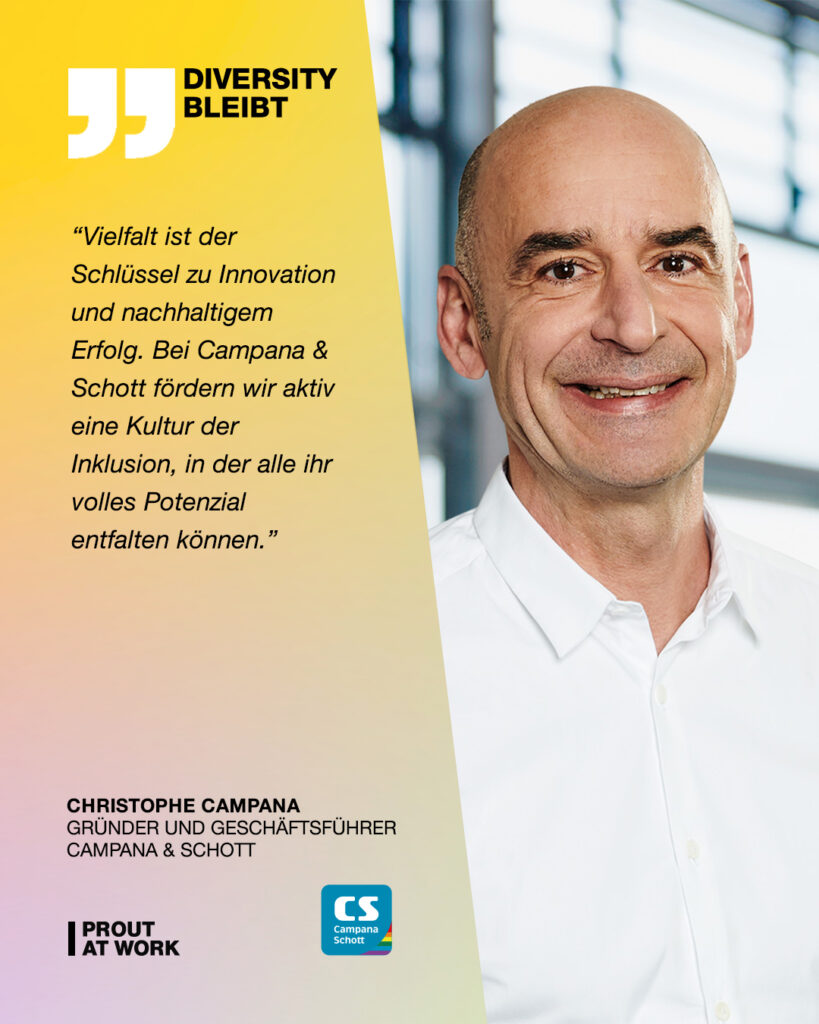
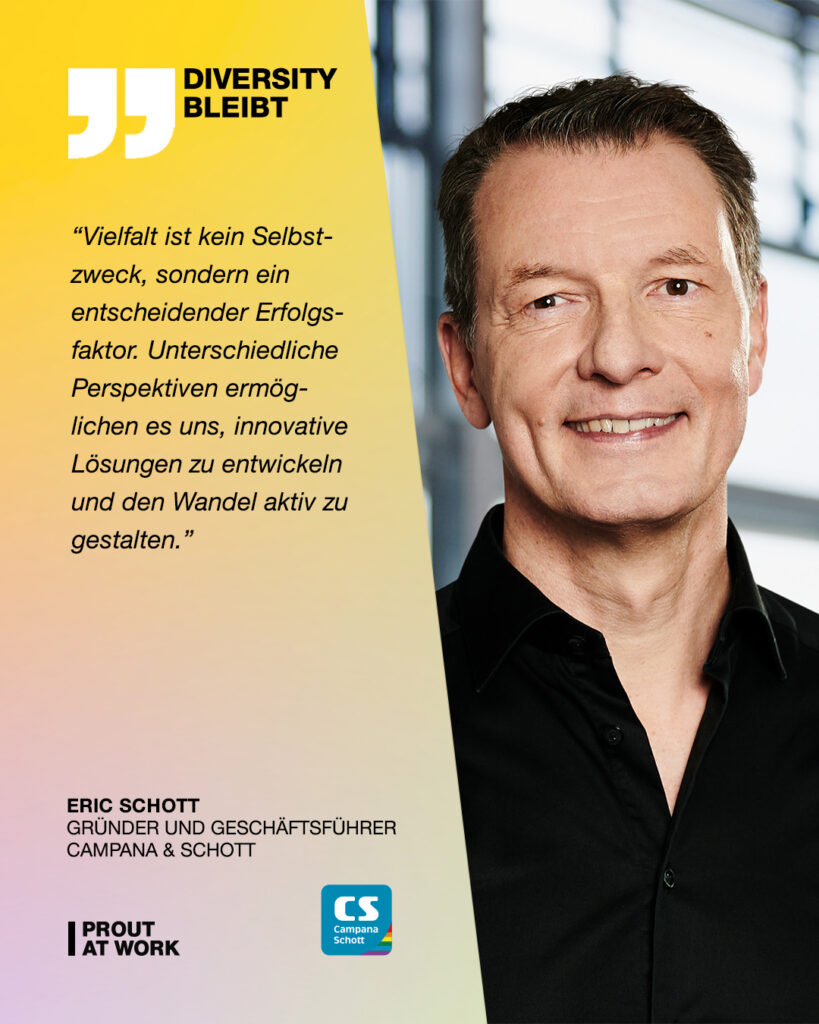
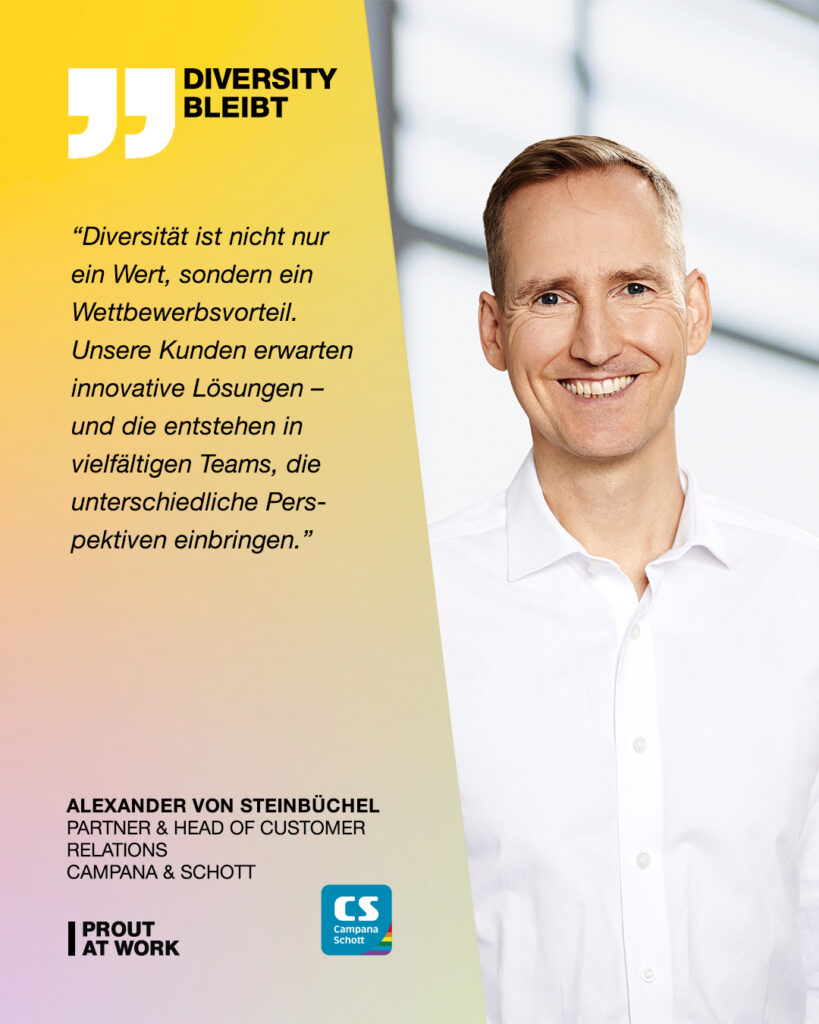
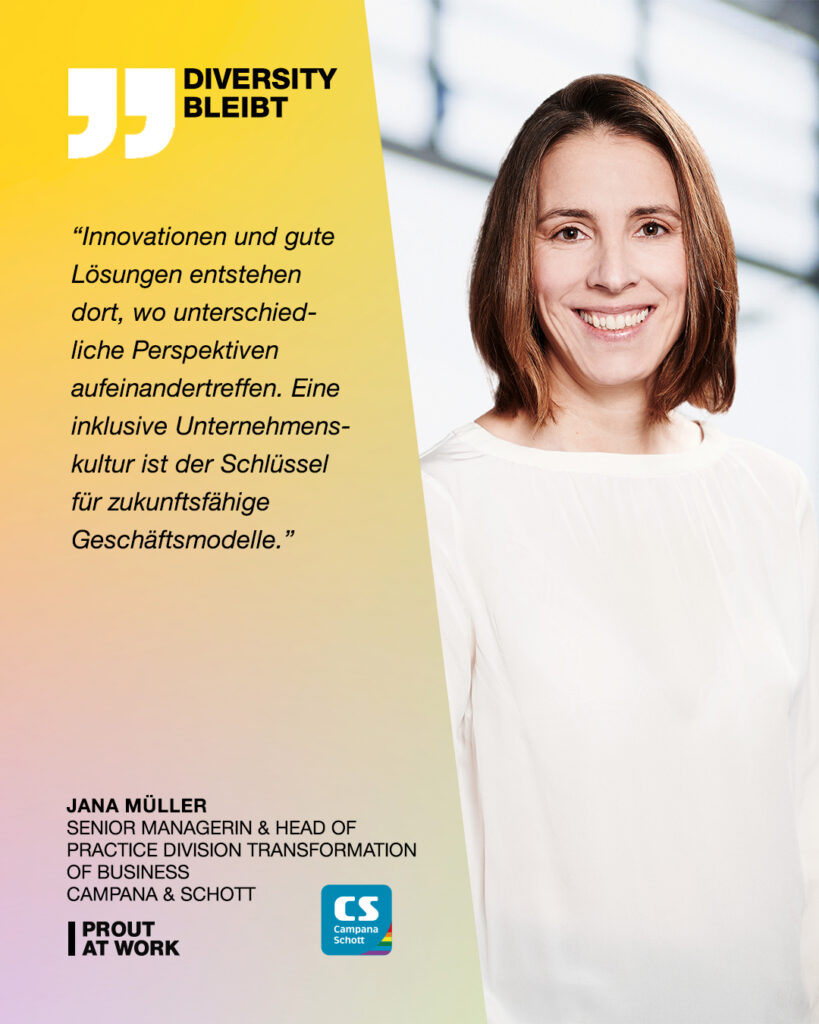
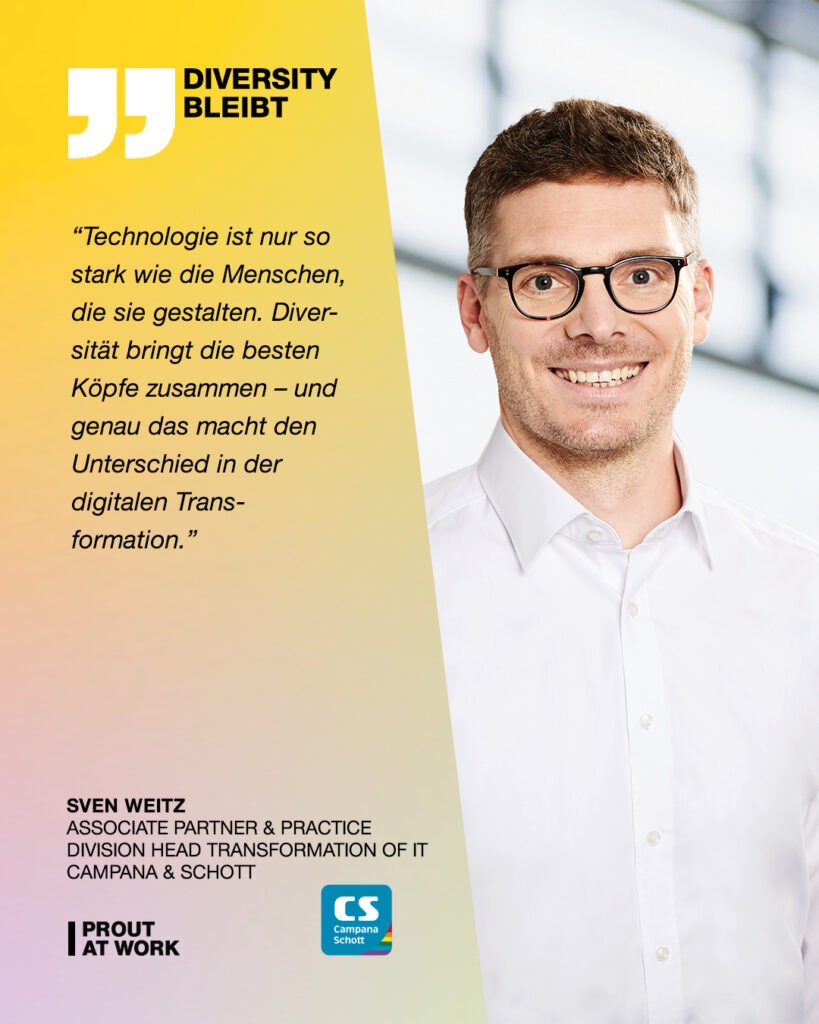
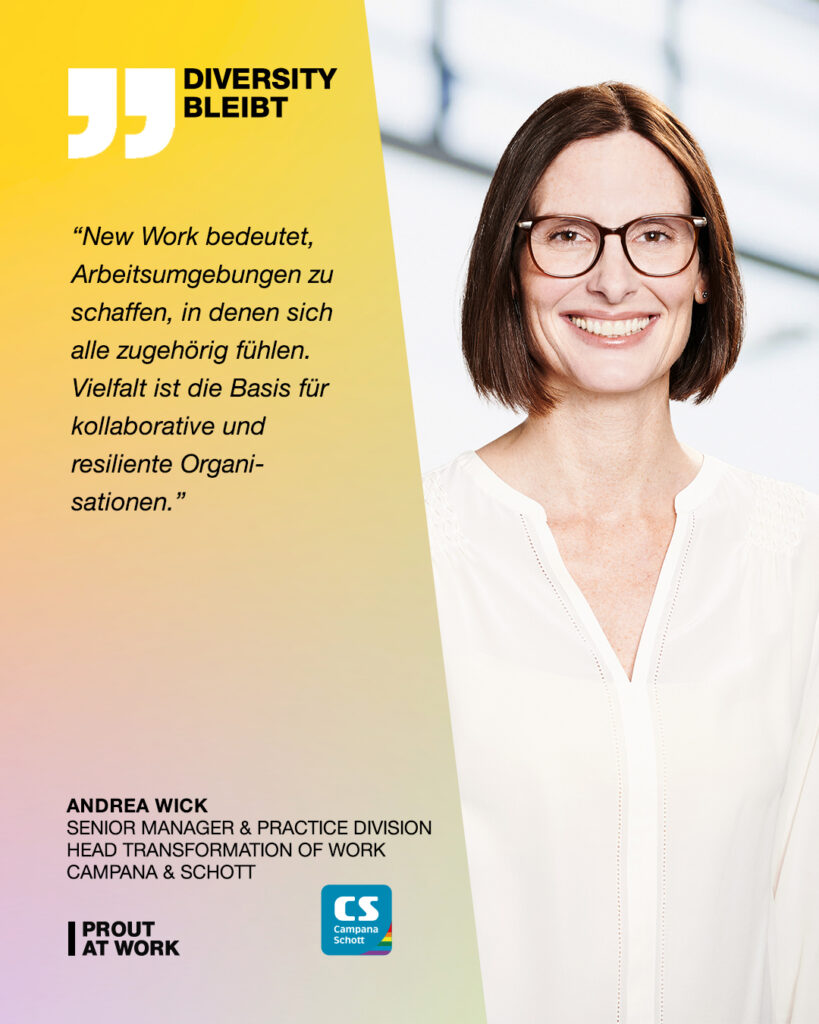
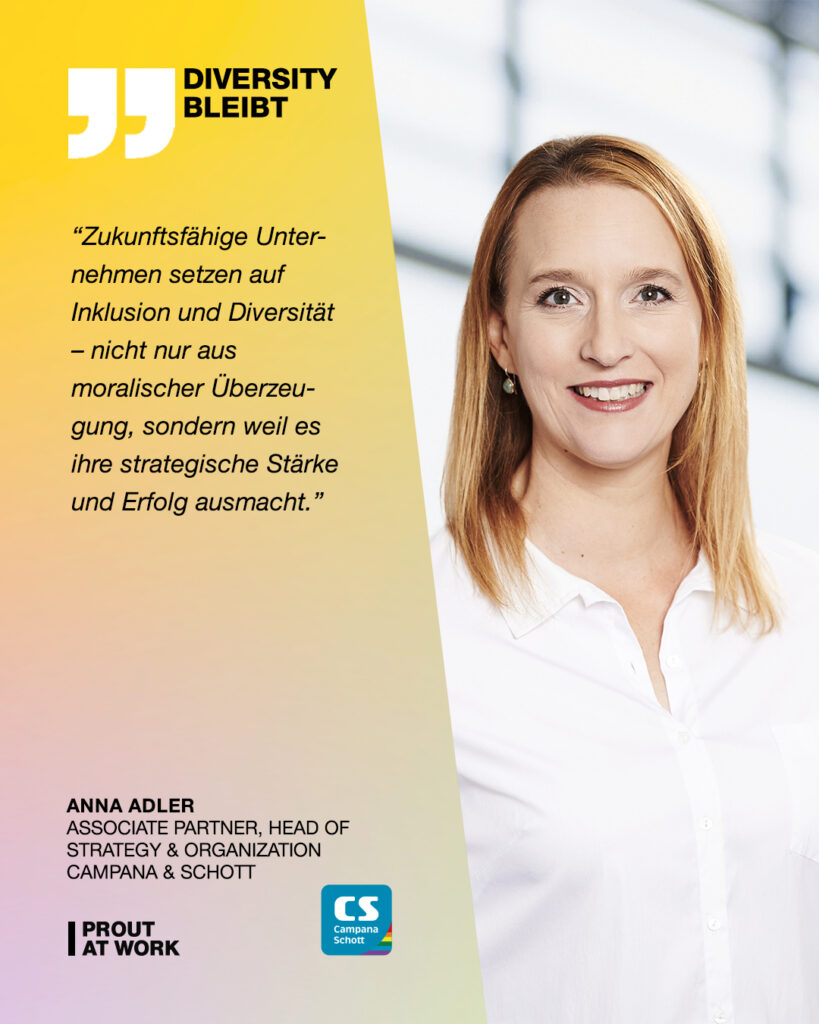
With numerous statements, the companies make it clear why they continue to implement measures for diversity, equity and inclusion (DEI) and thus welcome people of any sexual orientation, gender identity, social or ethnic origin, religion and ideology, physical and mental abilities and any age in the company and promote respectful coexistence.
‘We are delighted that so many companies have joined the ‘Diversity stays! We currently need to stand together even more and speak out in favour of diversity and equal opportunities in the world of work despite the headwind from the USA. The response to the campaign shows me that our work for queer diversity is bearing fruit and is being recognised in companies. Nevertheless, we also need to be visible outside our bubble and convince people who have little contact with the topic of queer diversity in the workplace.’ – Albert Kehrer, CEO of PROUT AT WORK
Sources:
¹Frohn, D. & Heiligers, N. (2024). »Out im Office?!« Die Arbeitssituation von LSBTIQA* Personen in Deutschland. IDA | Institut für Diversity- und Antidiskriminierungsforschung.
²Diversity matters even more (2024). McKinsey & Company.
³Diversity wins: How inclusion matters (2020). McKinsey & Company
Follow us on Social Media!
Instagram: https://www.instagram.com/proutatwork/
LinkedIn: https://www.linkedin.com/company/proutatwork/
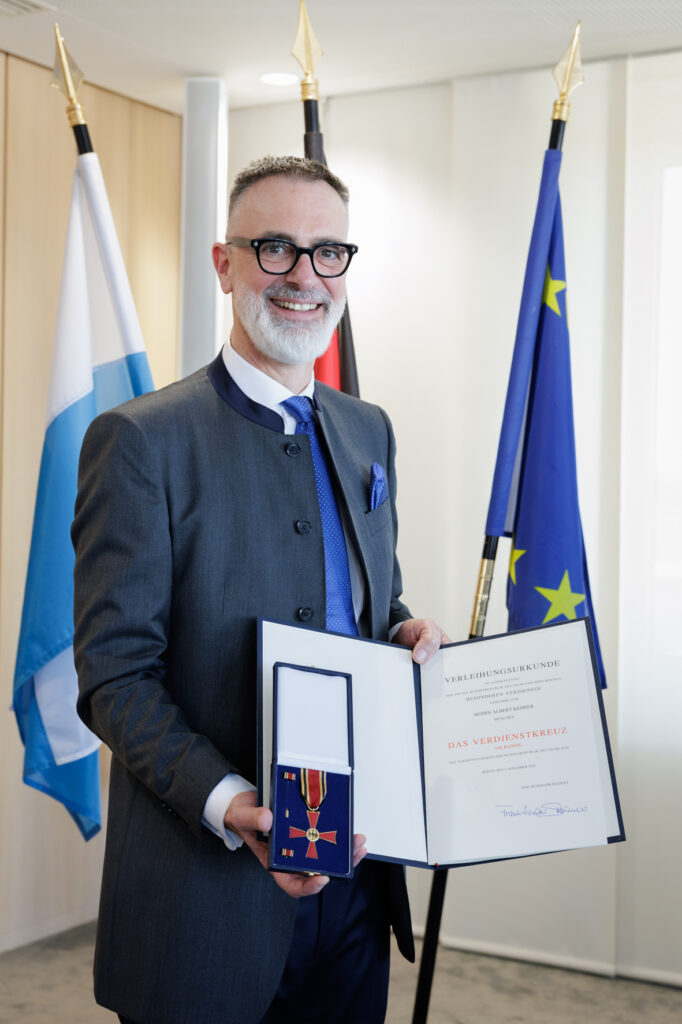
On Thursday, March 20, 2025, the Federal Cross of Merit on Ribbon was presented to Albert Kehrer, CEO of PROUT AT WORK, at a ceremony at the Ministry of Social Affairs in Munich. Albert Kehrer was honored for his long-standing and tireless commitment to queer diversity and equal opportunities in the world of work.
The Order of Merit of the Federal Republic of Germany (Federal Cross of Merit) is the highest recognition awarded by the Federal Republic of Germany for services to the common good. It is awarded to German and foreign citizens for political, economic-social and intellectual achievements as well as for all special services to the Federal Republic of Germany, for example services in the social, charitable and humanitarian fields.
“This award is a great honor – not only for me personally and for the PROUT AT WORK Foundation, but for everyone who is committed to queer diversity and equal opportunities in the world of work. It shows that the commitment and work of PROUT AT WORK is seen and appreciated. Diversity is not a marginal issue, but a strength of our society – and as a board member of PROUT AT WORK, I will continue to work with full conviction for an open and non-discriminatory working world,” says Kehrer.
Albert Kehrer’s career and commitment
Albert Kehrer founded the “LGBTIQ employee network” at IBM back in 2003 and managed it for several years. This network serves as a point of contact for queer employees and their supporters, offers confidential support and sensitizes managers to diversity issues. His commitment promoted the visibility and acceptance of diversity in business and society.
He later worked at KPMG as Head of Diversity & Inclusion for Germany, where he implemented programs for all diversity dimensions. Since 2010, Albert Kehrer has been working as an independent diversity expert, coach and consultant, with a focus on managers. He is listed as an expert by various organizations and has continuously promoted the topics of diversity and queer diversity in the workplace.
Albert Kehrer has also been active on a voluntary basis: he was a board member of “Völklinger Kreis e.V.”, the federal association of gay executives, and founded an initiative for queer employee networks together with Jean-Luc Vey in 2006. This initiative led to the founding of PROUT AT WORK in 2013.
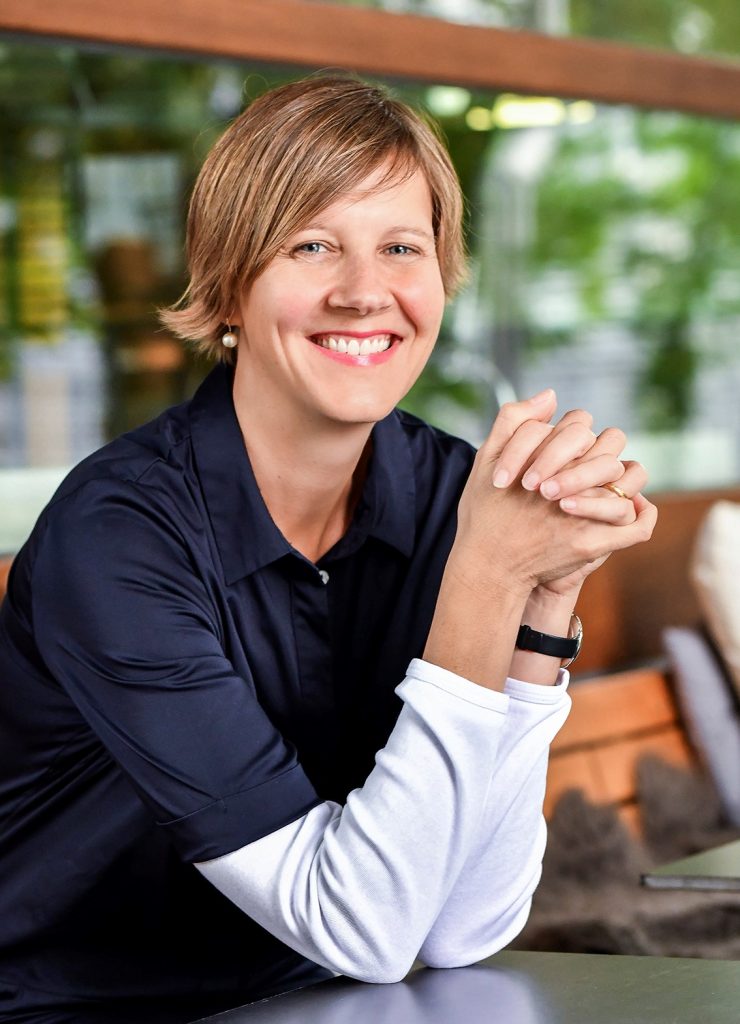
“Through his many years of commitment, Albert has made a valuable contribution to the establishment and further development of queer networks in companies. The award is a strong and important signal that diversity and inclusion must also be seen and promoted in the workplace.” – Dr. Antonia Wadé, Chairwoman of the PROUT AT WORK Foundation Advisory Board
Impressions from the award ceremony
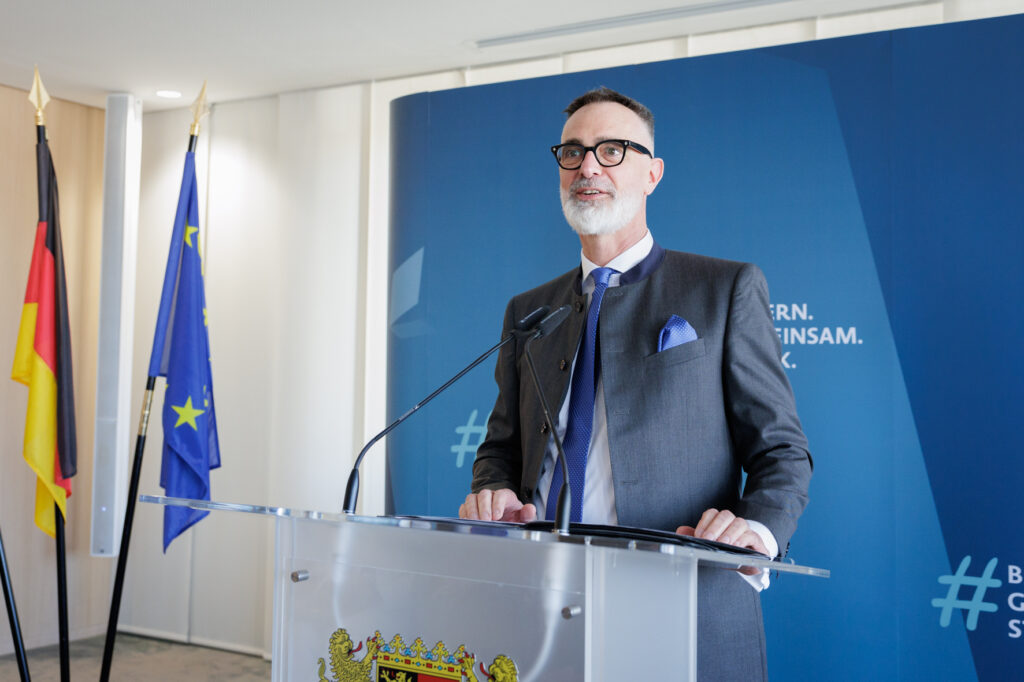
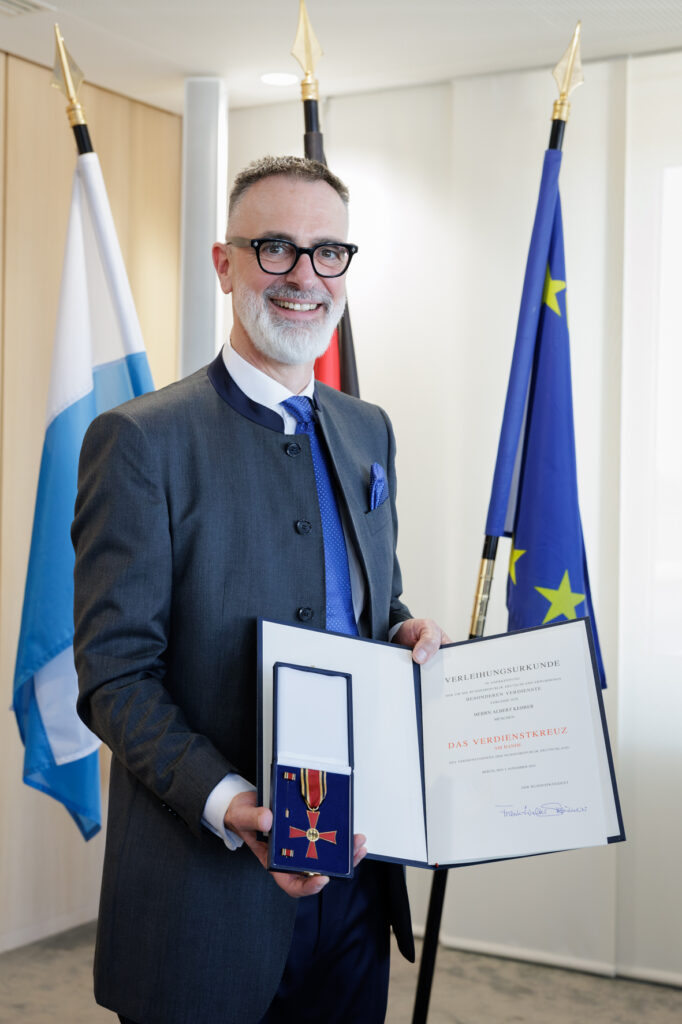
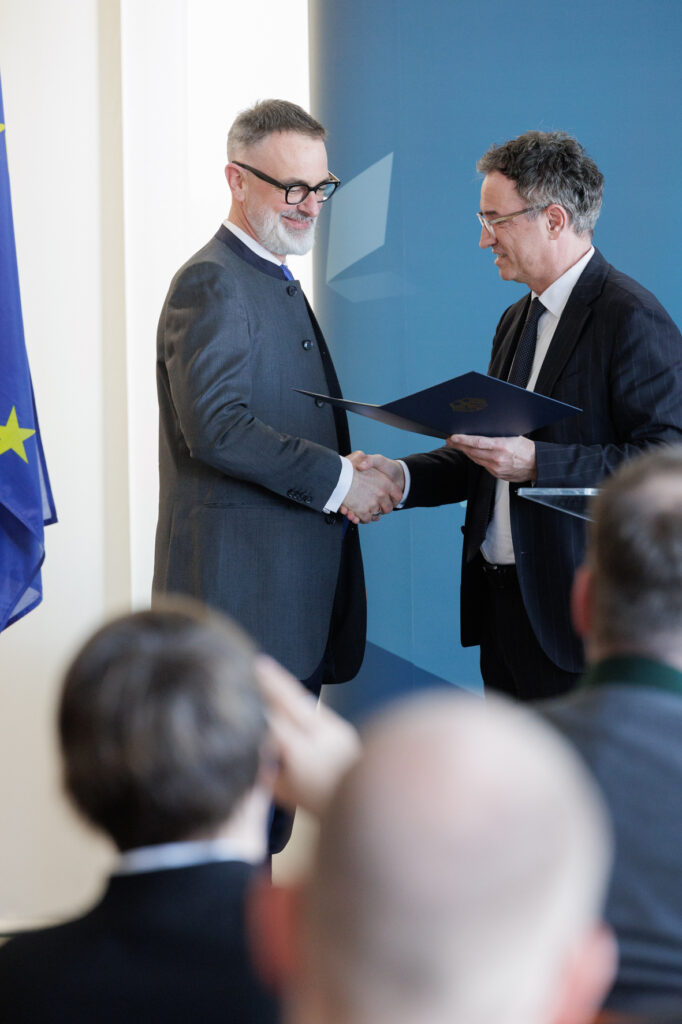
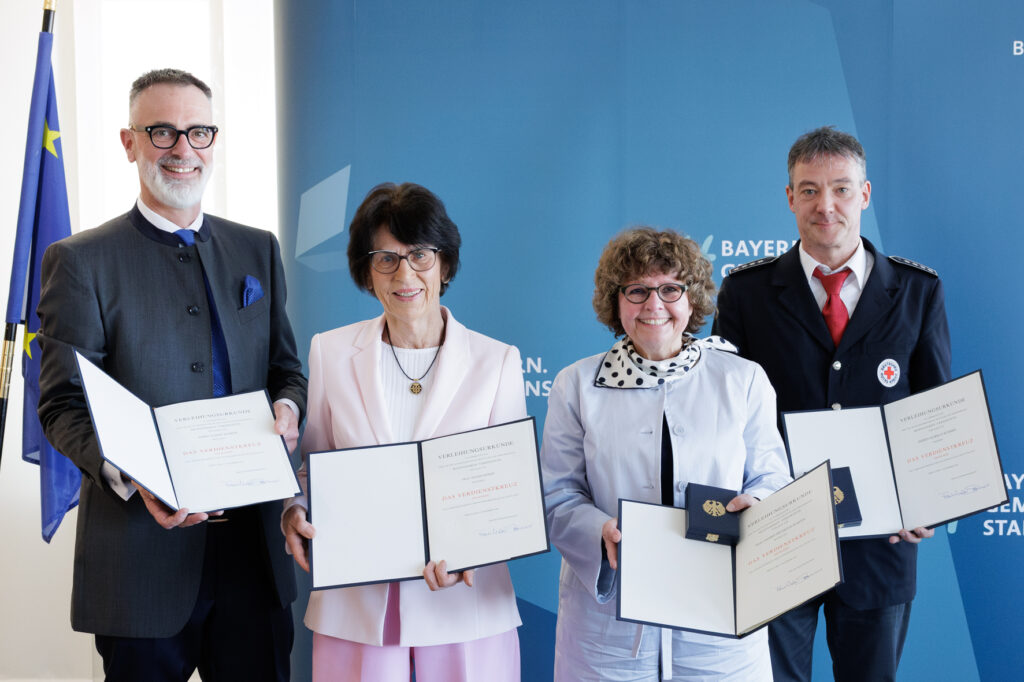
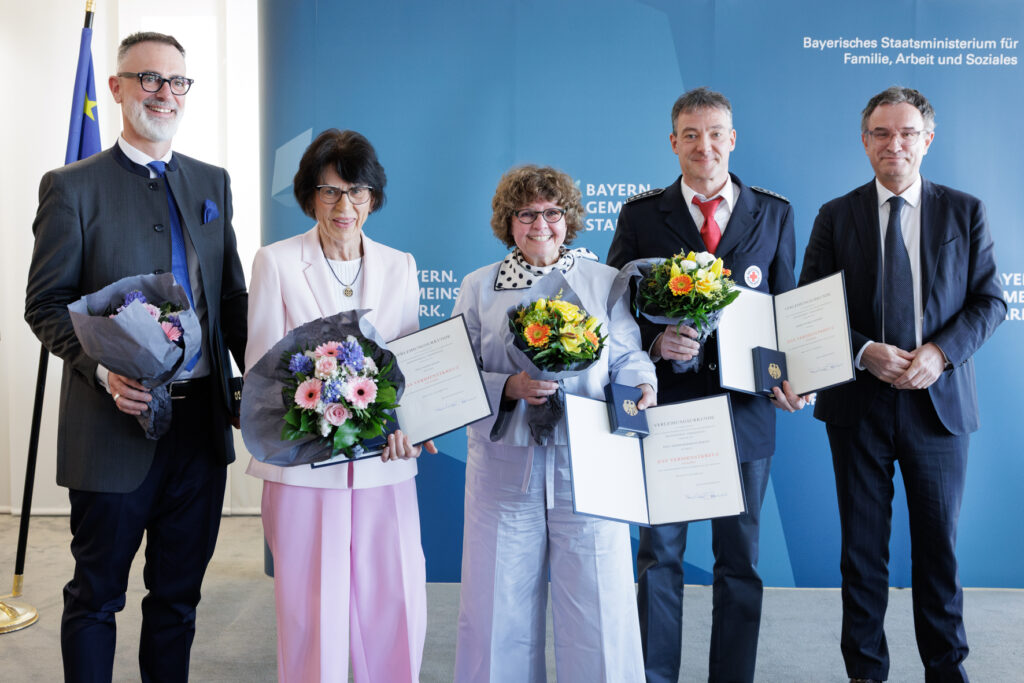
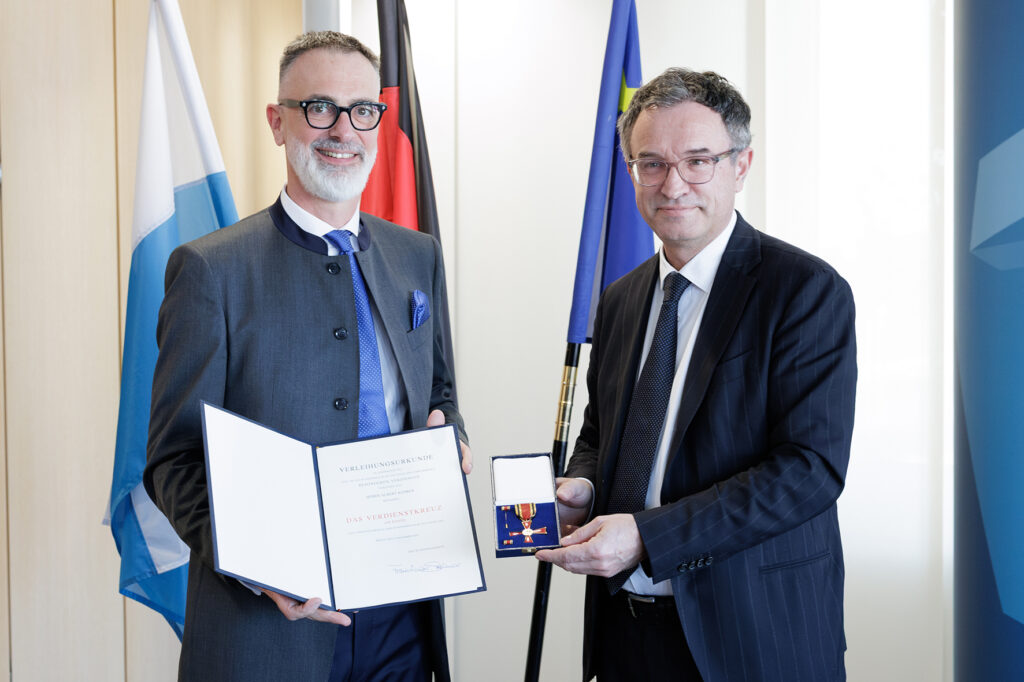
Copyright: StMAS/Schäffler
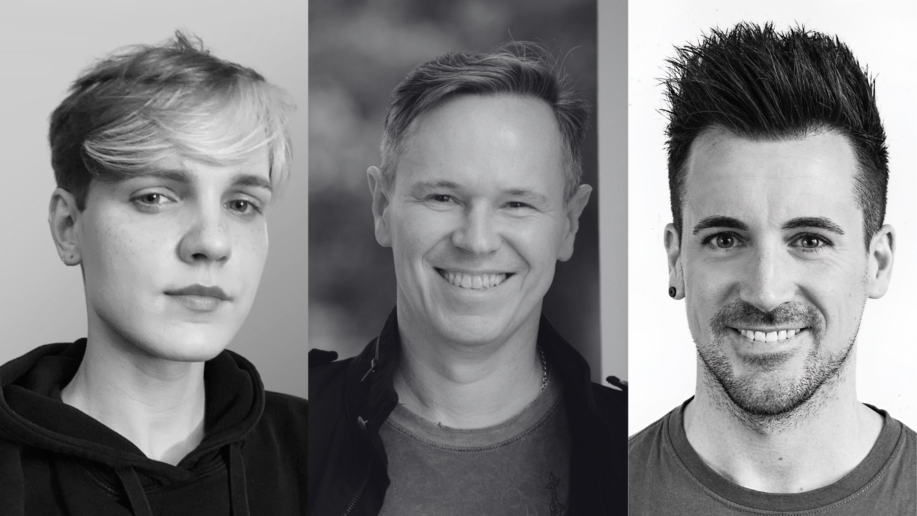
A talk with… Leon Wiersch, Detlev Blenk and
Christian Lemkens
PROUT AMPLIFIER
As part of our PROUT AMPLIFIER project, we not only talk to outstanding PROUT PERFORMERS, but also to committed people who are not yet heard as much, but who do at least as important work for queer diversity in the company. Detlev Blenk, Diversity and Inclusion Manager at IKEA, introduces us to his colleagues Christian Lemkens and Leon Wiersch, who are driving forward exemplary work for queer diversity and equal opportunities in the workplace, particularly in their areas of responsibility. We spoke to them about their commitment at IKEA and their motivation behind it.
How important are diversity and queer friendliness in your
company?
Detlev: The retail sector in general employs an above-average number of queer people, and it’s the same at IKEA. Based on global surveys, we assume a figure of 10 to 13%. This large figure alone places a special focus on our diversity and inclusion activities. Our credo: All people should be allowed to be who they are at IKEA – regardless of age, origin, gender, sexual or gender identity and physical or mental abilities.
What values characterize your day-to-day work and how are
they lived?
Detlev: The culture at IKEA is very much determined by our values. These have their origins in Sweden and characterize our interactions, our encounters with customers, applicants and suppliers.
What makes Leon and Chris role models and why exactly should
their perspectives be heard and seen?
Detlev: I thought it was a great idea not to focus on the usual faces from the upper echelons of management, but to give a voice to those who do and achieve so much for the queer community in the company, at queer fairs or other events. Leon and Chris are two of many colleagues who are passionately involved either locally in an IKEA store or as a member of the network management of our queer employee network.
Is there a special moment (or a joint project/current
collaboration) with them that you would like to tell us about?
Detlev: Chris almost single-handedly managed the operational side of our national participation in the CSDs in Berlin and Cologne and motivated our colleagues on the trucks with a passion for a colorful and diverse world. Leon is a big driver of diversity and inclusion for his IKEA store and brings a lot of ideas to the table.
As an established PROUT PERFORMER, what can you learn from
your colleagues? Perhaps especially from younger ones or from
those from completely different fields of activity? Where does
it make sense to work together (even more closely)?
Detlev: We learn a lot from each other. As a gay man in my mid-fifties, I’ve had different experiences in life than Chris and Leon. Their queer experiences are broader and not just focused on the “G” in LGBTQIA+. I’m always happy to learn more. And, of course, they are much more relaxed than I am about getting through nine hours on a CSD truck. Everyone contributes here with their possibilities and experiences – in the spirit of IKEA: “You do your part, we do our part, together we create a better world for the many people”.
What job do you currently do at IKEA and how long have you been with the company?
Christian: I’ve been with the company for almost exactly 15 years now. Since February as IKEA for Business Country Specialist. In this role, I work closely with various interfaces (e.g. Marketing or Customer Fulfillment, but also the local stores) and implement the business strategy and corporate goals together with my colleagues.
Leon: I am also celebrating a small anniversary. I’ve been on board for two years. I originally studied product design. I’m now working as a visual merchandiser (Communication and Interior Design), which is more or less my entry-level job. Roughly speaking, that means I’m partly responsible for making IKEA look like IKEA.
„As a gay man in my mid-fifties, I’ve had different experiences in life than Chris and Leon. Their queer experiences are broader and not just focused on the “G” in LGBTQIA+.“
How do you experience being queer at work? Is it an issue that is
relevant in everyday life? If so, in what contexts/situations?
Christian: Our day-to-day work is characterized by diversity and values. I have the full support of my direct manager and our country management. I can’t pin it down to specific situations, as it’s completely normal for us to be who we want to be.
Leon: In fact, the topic is not that important to me. Our interactions are relaxed and friendly. The fact that everyone is on first-name terms, openly “shows their colors” and there is an open feedback culture helps a lot. Of course, colleagues ask questions from time to time. Not in an intrusive way, but out of genuine interest. But then you also have the opportunity to be an educator – I really like that.
Were/are there any challenges (in general/for you personally)
when it comes to “out at work”? How do you overcome them?
Christian: I dealt with the issue openly right from the start and therefore never experienced any rejection. However, not all colleagues seem to feel the same way. At an information event for allies, almost 10% of participants answered the question “Would your colleagues react positively if you introduced them to your (same-sex) partner?” with “No.” answered “No”. And half are afraid that they would be ostracized or ridiculed because of this. This is definitely a sign that we still have a lot of educational work ahead of us.
Leon: I think for many people, coming out internally is the hardest part. Before you come out, you first have to understand for yourself that you don’t need to be ashamed of things. In the end, in many cases you hold the key to your own cage in your own hands.
If there was one thing you could wish for in this context, what
would it be?
Christian: I would really like no one to have to justify or be ashamed of their own identity. Everyone should live the way they want to. Actually, I would also like us not to have to talk about such topics at all. It should be normal by now. Until it is, I will definitely continue to fight for it.
Leon: Every coming out helps to break with stereotypes. Of course, the decision to do so should be up to each individual. Queerness is super broad – a spectrum. And many parts of it are totally underrepresented. I hope we all have the courage to move freely along this spectrum and allow change.
„Queerness is super broad – a spectrum. And many parts of it are totally underrepresented. I wish us all the courage to move freely along this spectrum and allow change to happen.“
How are you committed to queer issues at IKEA? What are you
particularly proud of?
Christian: I put my heart and soul into our Pride network and it makes me very proud to be able to show that we respect and value all people in their diversity. We try to create visibility for our issues and advocate for more tolerance and understanding in our dealings with one another. Since the network has been managed from the German head office, the local stores are increasingly following suit and setting up local diversity groups. This is a great development that we are naturally happy to support.
Leon: I can get straight to the point. After my first participation in the CSD, I really wanted to take the spirit back to Wuppertal and get involved in a local diversity group. The idea is great, but the implementation – i.e. founding and organizing it – is not that easy. The network – especially Detlev – gave us great support and helpful tips. From the next financial year, a local diversity group will actually be firmly anchored in every store.
Is there a special action/project/progress you would like to talk about?
Christian: What I am very pleased about is that we reactivated our Pride network last year. There are a lot more activities taking place again in our units on the topic of diversity in the workplace and we took part in the CSDs in Cologne and Berlin. There used to be a Pride group many years ago, but unfortunately the work “fell asleep” at some point. Now we’re back and louder than ever. With the start of our new financial year in September, I am part of the national management of our Pride network and already have lots of great ideas on how we can make the topic more visible and also get our customers involved.
What is important in the job so that queer (network) work can
succeed?
Christian: The mindset! And the support from our units and allies. We have over 22,000 employees in Germany alone. It’s not possible for just five people in a Pride network group to drive the issue forward and make it visible. We need allies who give us self-confidence and back us up.
Leon: Talk a lot and show genuine interest. Good and comprehensive communication is the be-all and end-all. This increases everyone’s chances of really being heard.
How important is it to be “out” at work? Is this equally possible
for all colleagues?
Leon: Every coming out – no matter where – makes the world a better place, ensures more visibility and is usually an incredibly great liberation for you too. Once you have come out internally and decide to do so externally, it is of course super important that the working environment also offers a safe space for diversity.
How important are role models in this context?
Leon: I myself could have benefited greatly from role models in the past. In fact, everyone seemed to know what was wrong with me before I knew it myself. As a child, I was always picked on because of this. Now my tactic is maximum transparency. The more open I am about my identity, the less of a target it is. At the same time, I am also very motivated to be a role model for others and to support people as a result. That gives me a lot in return.
„Every coming out – no matter where – makes the world a better place, ensures more visibility and is usually also an incredibly great liberation for oneself.“
Who or what has encouraged you on your path?
Christian: The question immediately brought tears to my eyes because it reminded me of my coming out to my mother and grandmother. My mother reacted pretty cool and asked me when we would finally go shopping together. It was a bit more difficult with my grandmother – she was very conservative about the subject (at the time). I was afraid to tell her and kept it a secret for many years. At some point, it came out by chance and I was very worried. I was all the more surprised and relieved when I was finally able to tell her and she sat on the couch knitting socks and said: “You’re my grandson, you always will be and I love you just the way you are.” From that moment on, I felt incredibly strong and had all the support I needed to go my own way with confidence.
Allyship: What makes a good ally?
Leon: Good allies listen and support. They look inwards and work on their own prejudices. In general, I think it’s very important for allies to be willing to learn and try to understand each other – and not just in a queer context. My best friends, for example, are PoC and unfortunately experience insults and discrimination time and again in everyday life. We all think it’s really nice when another person stands up for us (even if we’re not in the room ourselves, for example). But it’s just as nice when you can give something back.
Are you also active/engaged in queer contexts outside of work?
Leon: I engage in everyday conversations with friends and acquaintances. In my design degree, I wrote a thesis on binary-gendered product language that documents, exposes and criticizes the deliberate gendering of consumer goods. There are examples of this in everything from shampoo bottles to razors, sweets, teas, etc. – actually in every area. Even barbecue sausages and stationery were clearly ascribed to a binary gender by the product language and advertised exclusively for a single gender. I’m really glad that IKEA is making an effort to be neutral in this respect and refrains from stocking products only for men OR only for women. I also found it exciting that I was able to take part in “Verqueerte Identitäten” (a master’s thesis about the experiences of genderfluid people) and share my experiences and development as a non-binary person.
What are your plans/wishes/goals for the future? What are you looking forward to?
Christian: I am looking forward to the intensive networking work. I have a personal urge to get more involved, especially as certain groups are getting louder and louder. If the “right” is getting louder, so must we. My wish is that one day we will live in a society where everyone is happy and can simply be who they want to be!
Leon: I want even more visibility in the store. I want to get to know more perspectives, experience more “colorfulness” and, above all, learn more about other communities that I have had less contact with so far. Because that’s exactly how we can learn, develop and change.
Detlev, Christian and Leon, thank you very much for the
interview!
Find out more about our PROUT AMPLIFIER project here.
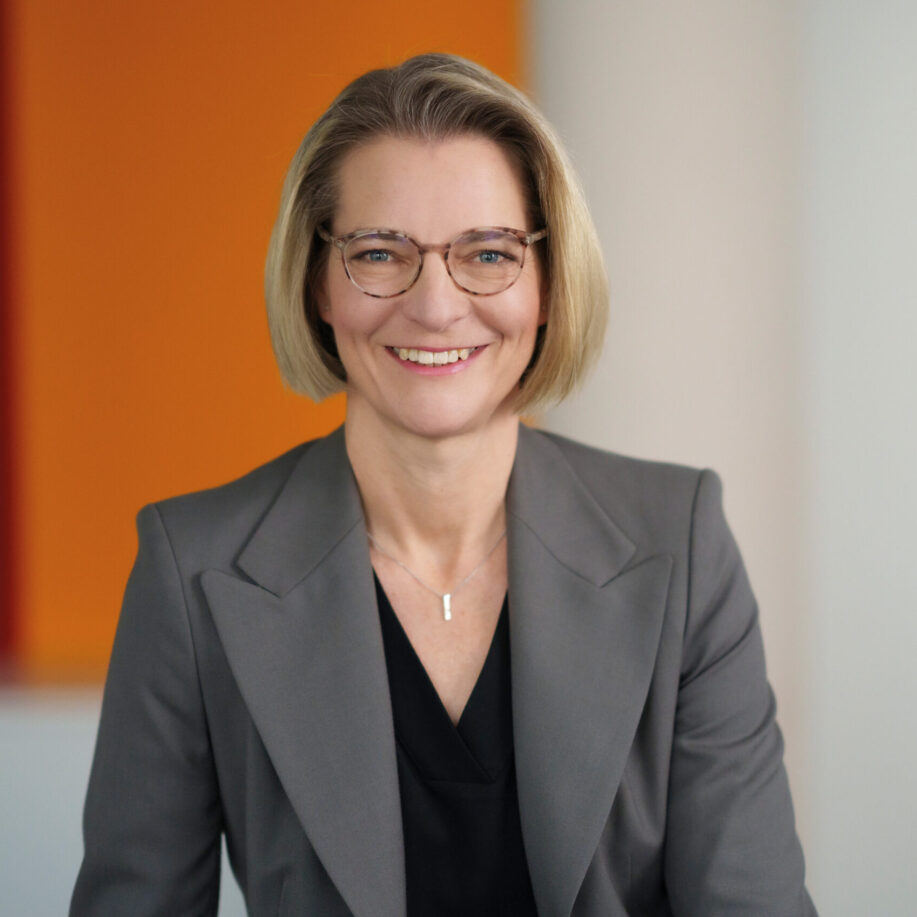
PROUT EMPLOYER BASF
„As long as we have not yet managed to create these conditions in the world of work and society for everyone, we will miss out on opportunities and not use our full potential.“
Katja Scharpwinkel was born in Hagen in 1969. She studied chemistry at the University of Münster and received her diploma in 1994, followed by her doctorate in 1996.
As a member of the Executive Board, she is responsible for European Site & Verbund Management; Global Engineering Services; Corporate Environmental Protection, Health, Safety & Quality and the Europe, Middle East, Africa region.
WHAT DOES IT MEAN FOR YOU AS SITE MANAGER FOR THE LUDWIGSHAFEN
SITE TO STAND UP FOR MORE QUEER DIVERSITY AND VISIBILITY?
Dr. Katja Scharpwinkel: In my role as site manager, it is my job to bring the team at the site together. With the challenges of the present and future, it is important that we are motivated and, above all, united in working towards our goals. This is only possible if no one has to struggle with reservations or artificial barriers. This applies not only in Ludwigshafen, but also in our private lives. An important step in breaking down reservations is exchanging ideas and getting to know each other. I want to help drive this forward – and I know that I am not alone in this, but have many committed people at my side – at BASF and in the PROUT AT WORK network.
WHAT DO YOU THINK OF THE STATEMENT THAT FROM NOW
ON MORE IMPORTANT ISSUES THAN QUEER DIVERSITY?
Dr. Katja Scharpwinkel: I think there is no point in weighing up issues that move and shape society against each other. We shouldn’t put climate protection and the necessary (energy) transformation on the back burner because of a pandemic or the wars in Ukraine and Gaza.
And so queer diversity remains as relevant as ever. For me, it also stands for tolerance, cohesion and humanity. These values are the basis of our coexistence in a democracy – we must protect them no matter what. Anything else would be a big step backwards for our society.
WHY IS IT A MATTER CLOSE TO YOUR HEART TO
SUPPORT QUEER DIVERSITY?
Dr. Katja Scharpwinkel: Like most people, I want to work in a company where I can be who I am. Only then can I be motivated and have fun, only then can and will I contribute my best. As long as we have not yet managed to create these conditions in the world of work and society for everyone, we will miss out on opportunities and not use our full potential. This is a situation that has been unacceptable not just since the skills shortage. That is why I am committed to diversity in both my private and professional life.
Dear Katja, thank you very much for the interview!
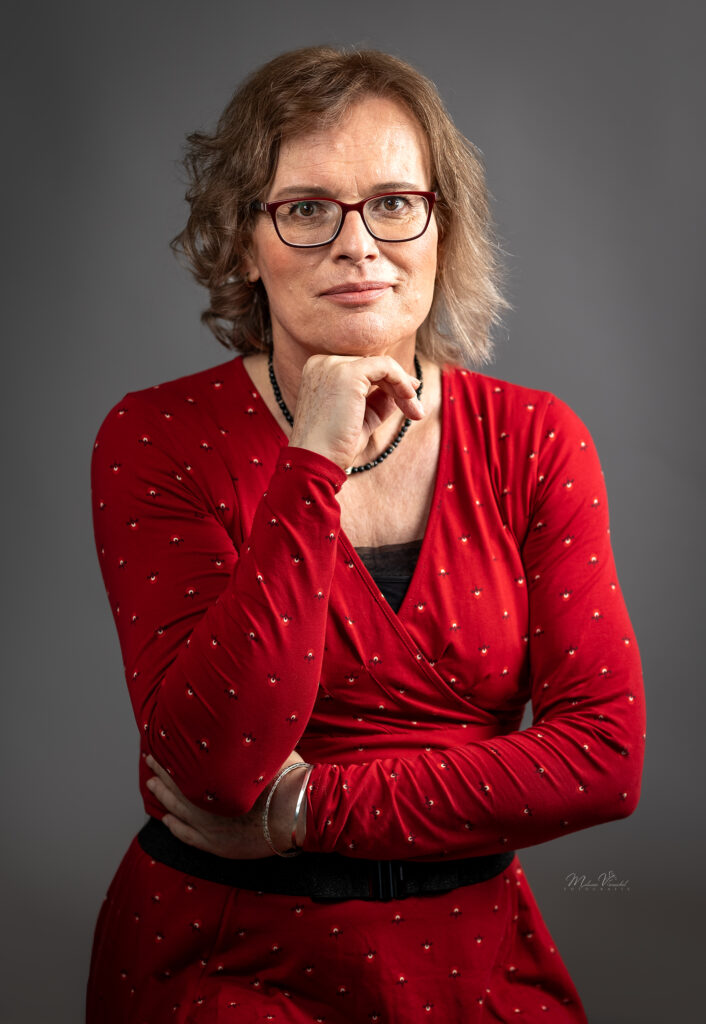
MYSTORY with …
marit
60 years, ludwigsburg
“Trans* is something wonderful – this sentence sums up what I call gender euphoria.”
Published: January 2024
There are many coming out stories and for most trans* people they are amazingly similar, even though we all have very individual paths. That’s why I don’t want to go into my various coming-out stories.
I am 60 years old and have been living openly as a woman for almost four years – 24 hours a day, 365 days a year. My environment had to experience this quite abruptly. Apart from my partner and a few trusted people, nobody was prepared. Nevertheless, hardly anything changed for anyone when I suddenly walked out the door as a woman. Here I would like to describe what inspired me on my journey and what brought my life out of the gray area.
Trans* is something wonderful – this sentence sums up what I call gender euphoria.
My first appearance as a woman at a seminar group meeting was a big moment for me. Apart from a brief email, I hadn’t let anyone know about my change beforehand. As I hadn’t seen some of the participants for a while, not everyone recognized me straight away – but I felt the same way. I was initially taken aback, but then the ice was broken and the unanimous opinion was that the ladies present (including me) had held up better than the more or less aged men. When I was accepted into the group of women as a matter of course, it was clear that I had arrived in my own world.
Hormone therapy wasn’t actually my goal, but I didn’t want to lose my hair, so I agreed to replace testosterone with oestrogen. What I didn’t know was that it wasn’t just my body that would change and suddenly become sensitive to cold and less strong. I was also suddenly able to perceive and allow my feelings. Sometimes I stood in the kitchen and had tears in my eyes for no external reason – with happiness that all this was still possible for me, which I would never have expected before. Later, there were also sad occasions to cry, such as goodbyes or broken friendships.
Self-confidence was never my thing as a man. Why should I be, I was a creature that wasn’t at peace with myself. I was always defensive, afraid of making mistakes or embarrassing myself. I was almost invisible because of my caution.
As a woman, I now have the courage to do things, make decisions and accept help. Why? What could happen if something goes wrong? After all, I am a human being with strengths and weaknesses and I am allowed to make mistakes, but also to be successful.
This was most noticeable at work. My colleagues accepted me, even though I often went out on a limb and sometimes had to back down.
Are women at a disadvantage compared to men at work? Yes, and this is mainly due to structural reasons rather than differences in personality. Nevertheless, as a late-career woman with a male socialization, I always automatically see the (working) world from two perspectives. On the one hand, I know the “typical male” behavioral patterns such as competitive thinking or fear of failure and can adapt to them. On the other hand, in recent years I have developed “typically female” characteristics such as communication skills, empathy and a willingness to cooperate, and I consciously use these to achieve the respective team goal. It never ceases to amaze me that I am much more effective in my working environment as a woman than I was previously in my imposed male role.
An important prerequisite for my transition was the support I received from my employer. The management’s statement in favor of diversity and against discrimination allowed me to embark on my journey without any existential fears. However, I received hardly any support with the practical implementation. I had to work out every step myself and obtain the necessary information. I also had no role models in my working environment apart from a colleague in the queer company network who had managed to change her first name.
I wanted to improve this situation and started offering online training sessions on the topic of transgender and also wrote a company guide. My presentations are now well attended and contribute to the visibility of transgender issues in the workplace. They bring the topic out of the dark taboo corner. We have received a lot of positive feedback on our transgender guide and an English-language version is due to be published soon. Volunteers have already come forward to translate it into other national languages.
Positive visibility has increasingly become a matter close to my heart. There is already enough negative visibility for trans* people and I want to do something about it.
So I started to offer my experience in the corporate environment as a consulting service for other companies. However, visibility or reach is crucial in online business and I still have a lot to achieve in this area. My new project has potential, but still has a long way to go.
I would like to conclude my thoughts with a personal experience that has shown me that I am on the right path. A few weeks ago, I saw an attractive woman through a window in a building with lots of glass. Only the upper half of her face was visible and she maintained intense eye contact. I immediately liked her and wanted to reach out and speak to her. As I started to move, I realized that I already knew her. This woman was me – reflected in the window glass at dusk.
There are many beautiful, small and big events and developments on my path – just like on the path of all other trans* people. I would like to share this here in order to focus on the positive in these difficult times.
dear marit, thank you very much for YourStory!
Show Your true colors!
Das Interview mit Julia wurde für den PRIDE DAY GERMANY 2024 geführt.
Wie zeigt Ihr queeren Menschen an Eurem Arbeitsplatz, dass sie in ihrer ganzen Authentizität willkommen sind?
Am 04. Juli feiern wir den PRIDE DAY GERMANY. Der Aktionszeitraum ist jedoch länger geöffnet! Noch bis zum 25. Juli könnt Ihr Eure Aktivitäten für Queer Diversity einreichen und habt damit die Chance zum PRIDE DAY CONTEST Publikumsliebling zu werden! Im sechswöchigen Aktionszeitraum zeigen wir jährlich Eure Firmenaktionen für Queer Diversity auf unserer Website und Eure Kommunikation auf unserer Social Media Wall. Im anschließenden
PRIDE DAY CONTEST führen wir ein Publikumsvoting durch und küren die drei Aktionen mit den meisten Stimmen zu Publikumslieblingen!

MYSTORY mit …
julia
29 Jahre, düsseldorf
„sich über erlebnisse, Gedanken, empfindungen, gefühle und wahrnehmungen auszutauschen und dabei eine verbindung zu menschen zu spüren, ist ein aspekt von vielfalt, auch geschlechtlicher vielfalt, den ich sehr wertvoll finde.”
Veröffentlicht: Dezember 2023
Zuerst ein paar Fakten über mich: Ich bin 29 Jahre alt, trans* und lebe seit etwas mehr als fünf Jahren als Frau. Aufgewachsen bin ich in einer Kleinstadt in Süddeutschland, wohne aber nach einigen Stationen hier und da mittlerweile in Düsseldorf. Dort arbeite ich bei einem Versicherungsunternehmen als Aktuarin und bin im LGBTIQ+ Mitarbeitenden-Netzwerk aktiv.
Als Aktuarin beschäftige ich mich viel mit Formeln und Zahlen. Ich setze mich zum Beispiel mittels mathematisch-statistischer Methoden mit der Modellierung, Bewertung und Steuerung von Risiken auseinander – bin also ziemlich rational im Job unterwegs. Gleichzeitig freue ich mich als Teil des LGBTIQ+ Netzwerks über jeden Austausch mit Menschen, um Gedanken, Gefühle und Perspektiven besser verstehen zu können, insbesondere zu Themen aus dem Bereich DEI (Diversity, Equity and Inclusion) und LGBTIQ+. Daraus können viele Ideen und Verständnis entstehen und ein gemeinsames, inklusives Miteinander wachsen. Beide Seiten der Arbeit machen mir viel Spaß!
Im Umgang mit geschlechtlicher Vielfalt am Arbeitsplatz stehen für mich folgende Fragen im Fokus:
- Schweigt man über einen wichtigen Teil der eigenen Identität oder kann man offen damit umgehen?
- Kann man ein authentisches Selbst mit der Welt, den Mitmenschen und den Personen im Arbeitsumfeld teilen?
- Wird man angenommen, wie man ist?
- Funktioniert der Arbeitsplatz als System für eine Person?
- Wird inklusiv mit Personen, Identitäten und ihren verschiedenen Bedürfnissen umgegangen?
Es geht um die Fragen: Wer bin ich? Wer möchte ich sein? Und dann auch: Kann ich diese Person am Arbeitsplatz sein? Diese Fragen sind sehr tiefgreifend. Das zu erkunden und herauszufinden war ein langer Weg für mich, der auch nie wirklich zu Ende sein wird, denke ich. Ein essenzieller Teil meines Weges waren die Menschen, die ich um mich hatte.
Für mich ist meine Identität als Frau, mein trans* Sein, mein Hier und Jetzt auch stark mit Menschen verbunden: mit meiner Schwester; mit Freundschaften, die mich schon lange begleiten; mit Menschen, die sichtbar waren und Raum eingenommen haben. Sie haben mir das Gefühl gegeben, die Freiheit zu haben, mich ausprobieren zu können, ohne dafür verurteilt zu werden.
Sie haben manche Fragen gestellt, aber gleichzeitig oftmals keine Fragen gestellt und mein Sein sich einen Weg bahnen lassen. Das Gefühl, wenn sich etwas richtig anfühlt, ist unglaublich erfüllend und überwältigend. Dieses Gefühl musste ich zulassen können. Mit diesen Menschen habe ich viele dieser Momente zusammen erleben dürfen: gemeinsam Sport zu machen, den eigenen Körper wahrzunehmen und eine Beziehung dazu aufzubauen, den Körper als Medium des Ausdrucks zu nutzen, zu tanzen; Kleidung, Make-Up, Musik und Kunst als Interaktion mit der Außenwelt zu sehen und zu nutzen. In ihrer Vielfalt können sie so viel ausdrücken: Freude, Freiheit, Stärke und das Gefühl, die Welt umarmen zu wollen – aber genauso Ruhe, Schwäche, Trauer und das Gefühl, sich unter einer Decke verkriechen zu wollen. All das hat eine Dynamik in sich, die mir sehr viel gegeben und mir geholfen hat, die Fragen „Wer bin ich? Und wer möchte ich sein?“ zu erkunden.
Dabei führe ich gern Gespräche auf einer sehr menschlichen Ebene, die etwas Verbindendes ist, ohne dass man sich lange kennt. Menschlichkeit zu spüren und sich zuzuhören kann viel verändern: Man wird sich besser der eigenen Perspektive bewusst und erkennt auch eigene Privilegien. Gleichzeitig erweitert man die eigene Perspektive und sieht auch die Zusammenhänge und systemischen Aspekte. Sich über Erlebnisse, Gedanken, Empfindungen, Gefühle und Wahrnehmungen auszutauschen und dabei eine Verbindung zu Menschen zu spüren, ist ein Aspekt von Vielfalt, auch geschlechtlicher Vielfalt, den ich sehr wertvoll finde.
Liebe julia, vielen Dank für YourStory!
PRIDE DAY GERMANY 2024 & PRIDE DAY CONTEST
Hier geht’s zu allen Infos und zur Anmeldung.
Show Your true colors!
Das Interview mit Emre wurde für den PRIDE DAY GERMANY 2024 geführt.
Wie sorgt ihr an Eurem Arbeitsplatz für eine offene und wertschätzende Kultur?
Am 04. Juli feiern wir den PRIDE DAY GERMANY. Der Aktionszeitraum ist jedoch länger geöffnet! Noch bis zum 25. Juli könnt Ihr Eure Aktivitäten für Queer Diversity einreichen und habt damit die Chance zum PRIDE DAY CONTEST Publikumsliebling zu werden! Im sechswöchigen Aktionszeitraum zeigen wir jährlich Eure Firmenaktionen für Queer Diversity auf unserer Website und Eure Kommunikation auf unserer Social Media Wall. Im anschließenden
PRIDE DAY CONTEST führen wir ein Publikumsvoting durch und küren die drei Aktionen mit den meisten Stimmen zu Publikumslieblingen!
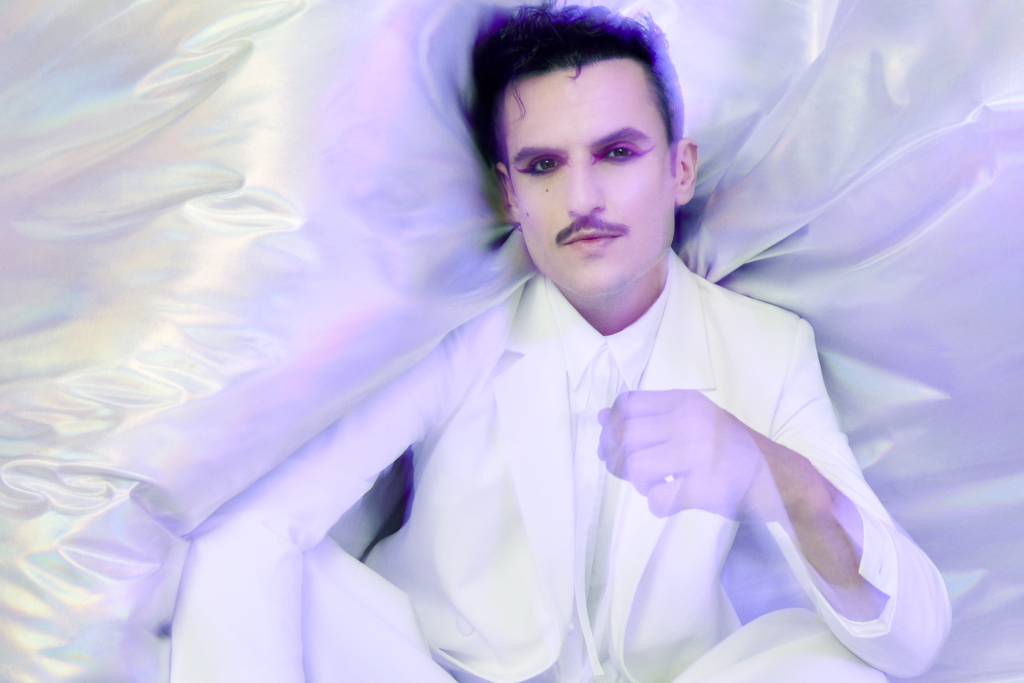
MYSTORY mit …
emre
32 Jahre, berlin
„wenn mich menschen fragen, wie ich meinen erfolg erreicht habe,
antworte ich, dass er auf meinen erfahrungen mit trauma beruht.”
Veröffentlicht: Dezember 2023
Als ich mich damals bei meiner alleinerziehenden Mutter geoutet habe, wusste sie nicht viel damit anzufangen, weil sie eine gleichgeschlechtliche Partnerschaft nicht kannte. Nach einigen Erklärungsversuchen meinte sie nur: „Emre, schon dein ganzes Leben lang wusstest du, das Gute vom Schlechten zu unterscheiden und immer den richtigen Weg einzuschlagen. Wenn diese Lebensform das Richtige für dich ist, dann unterstütze ich dich dabei.“ Das war wirklich einer der schönsten Momente in meinem Leben und hat die Bindung zwischen meiner Mutter und mir gestärkt. Denn es war nicht immer einfach …
Ich habe kein Abi, sondern nach dem qualifizierenden Hauptschulabschluss die Mittlere Reife und anschließend eine Ausbildung zum Personaldienstleistungskaufmann absolviert. Berufsbegleitend habe ich eine Weiterbildung zum Fachwirt gemacht und somit meine Hochschulzulassung erlangt. Sowohl meinen Bachelor of Law als auch meinen Master of Science in HR habe ich neben meinem Job gerockt.
Studieren und nebenher ein wenig zu jobben war für mich nicht drin, da ich die finanzielle Absicherung nicht hatte. Daher kam für mich nur ein Vollzeitjob infrage, den ich um ein Studium am Abend und am Wochenende ergänzt habe.
Viel Freizeit hatte ich damals nicht, aber es war schon immer mein Lebenstraum, zu studieren. Aus meiner damaligen Sichtweise habe ich ein Studium immer mit einem Privileg für Personen aus gutem familiärem Umfeld mit entsprechendem finanziellem Background verbunden.
In meinem Leben hatte die ethnische Diskriminierung zur Folge, dass mir zum Beispiel auf der Schule gesagt wurde, dass ich mit meiner ‚Herkunft‘ nicht viele Chancen haben werde. Außerdem habe ich zwei Ausbildungen abgebrochen, weil ich wegen meiner Armutsbiografie und meiner Nicht-Binärität extreme Formen von Klassismus und Homofeindlichkeit erlebt habe. Heute arbeite ich bei Google, lebe offen nicht-binär, bin als Antidiskriminierungsexperte tätig und mehrfach ausgezeichnet worden. Ich spreche als Experte mit Ministerien und den größten Konzernen der Welt.
Wenn mich Menschen fragen, wie ich meinen Erfolg erreicht habe, antworte ich, dass er auf meinen Erfahrungen mit Trauma beruht. In unserer Gesellschaft muss man außergewöhnlich sein, um existieren zu dürfen, und ich habe gelernt, damit umzugehen.
Daneben bin ich auch leidenschaftlicher Fußballspieler. Ich habe während meiner Zeit in München im ersten schwulen Fußballteam Deutschlands gespielt und mich dabei für LGBTQIA+ im Sport engagiert. Ganz aktuell habe ich den Verein ‚WeSpeakYouDonate‘, der sich für Vielfalt einsetzt, und ‚Occtopus‘ gegründet. Occtopus ist ein Unternehmen, das Kinderspiele entwickelt, um Vorurteile und Stereotype bei Kindern und Eltern aufzudecken. Darüber hinaus bin ich auch Content Creator auf LinkedIn und betreue meinen eigenen YouTube-Kanal ‚Emres Pink Pillow‘.
Aufgeben stand für mich nie zur Debatte. Ich habe mich immer wieder selbst motiviert und einfach weitergemacht.
Lieber emre, vielen Dank für YourStory!
PRIDE DAY GERMANY 2024 & PRIDE DAY CONTEST
Hier geht’s zu allen Infos und zur Anmeldung.
Show Your true colors!
Das Interview mit Anastasia wurde für den PRIDE DAY GERMANY 2024 geführt.
Wie sorgt Ihr dafür, dass trans* Menschen an Eurem Arbeitsplatz vor Diskriminierungen geschützt werden?
Am 04. Juli feiern wir den PRIDE DAY GERMANY. Der Aktionszeitraum ist jedoch länger geöffnet! Noch bis zum 25. Juli könnt Ihr Eure Aktivitäten für Queer Diversity einreichen und habt damit die Chance zum PRIDE DAY CONTEST Publikumsliebling zu werden! Im sechswöchigen Aktionszeitraum zeigen wir jährlich Eure Firmenaktionen für Queer Diversity auf unserer Website und Eure Kommunikation auf unserer Social Media Wall. Im anschließenden
PRIDE DAY CONTEST führen wir ein Publikumsvoting durch und küren die drei Aktionen mit den meisten Stimmen zu Publikumslieblingen!
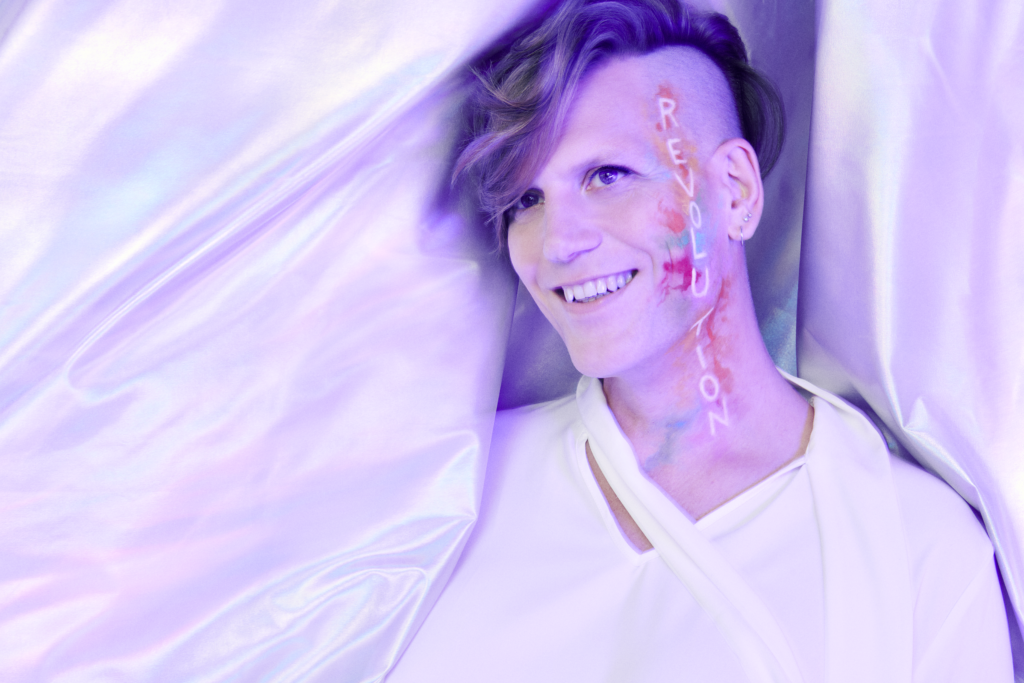
MYSTORY mit …
anastasia
49 Jahre, berlin
„meine nicht-anpassung, mein sichtbarer ausdruck als gender non-conforming, nimmt mir nicht mein frausein.”
Veröffentlicht: November 2023
Ich weiß nicht wirklich, wann meine bewusste und beschwerliche Reise zu mir selbst begonnen hat. Ich bin mir auch gar nicht sicher, ob das der entscheidende Punkt für diese Geschichte ist. Wenn ich auf mein Leben zurückblicke, erkenne ich heute, dass ich unterscheiden muss und möchte zwischen dem Weg zu mir hin als transgeschlechtliche Frau und meinem Leben als trans* Frau. Diese Unterscheidung ist mir persönlich wichtig, denn das Leben nach dem Coming Out 2015 hat mich als trans* und queere Person deutlich mehr geprägt als alles andere davor.
Mit 17 Jahren fand ich mich im Kleiderschrank meiner Mutter wieder und fühlte etwas Unerklärliches.
Immer mehr keimte in mir die Gewissheit, dass ich eben nicht der Mann bin, den die Welt in mir sieht und mich entsprechend als solchen behandelt. Ich konnte und wollte mit diesen Gefühlen nicht umgehen. Ich drängte meine wahre Identität zurück und zwang mich in die klassischen heteronormativen Muster. Mit Mitte zwanzig heiratete ich meine erste Frau. Zu dem Zeitpunkt war ich auch bereits Soldat in der Bundeswehr. Ich wurde 1994 eingezogen und entschloss mich dann für die Offizierslaufbahn. Zwei Institutionen, die in mir beide einen Mann sahen und stets erwarteten, prägten mein Leben. Im Verdrängen meiner Bedürfnisse war ich gut. Das Fehlen von trans* Vorbildern in der Gesellschaft verstärkte in mir das Bedürfnis, aktiv gegen mein inneres Ich vorzugehen. Scham und Abscheu gegen mich selbst waren meine ständigen Begleiter.
2015 durchbrach ich endlich dieses Muster. Ich konnte nicht mehr und wollte auch nicht mehr. Es war kein Mut, sondern Verzweiflung. Ich wollte endlich leben. Ich wollte ich sein. Mit diesem Schritt fing die zweite Phase an. Noch während der Transition merkte ich, dass ich zwar ich sein konnte, aber auch dieser Weg von Hindernissen und einer nicht immer akzeptierenden Gesellschaft geprägt war. Ich wollte sichtbar sein für andere trans* Personen. Ich wollte ein Orientierungspunkt für andere sein, meine Geschichte erzählen. Dieser Gedanke erweckte unwahrscheinlich viel Kraft in mir. Ich engagierte mich mehr und mehr und wurde langsam zu einer Aktivistin für trans* und queere Rechte – sowohl an meinem Arbeitsplatz als auch außerhalb der Gesellschaft.
Ich wehrte mich weiterhin gegen fremdbestimmte Zuschreibungen und Rollenerwartungen an mein nach außen gelebtes, weibliches Geschlecht. Ich habe genug davon, ständig daran gemessen zu werden, wie weiblich ich auf Dritte wirke.
Welche Attribute an mir, an meinem Körper, mich in der Fremdwahrnehmung als Frau bestätigen und welche den Hinweis auf meine nicht-cis-Natur geben. Ich bin froh, endlich an dem Punkt angekommen zu sein, der Bestätigung durch andere nicht länger zu bedürfen. Jahrelang hat mich das Gefühl, äußerlich nicht als Frau bestehen zu können, in meiner Identität zurückgehalten. Und meine nicht-Anpassung, mein sichtbarer Ausdruck als gender non-conforming, nimmt mir nicht mein Frausein.
Ich bin Anastasia, 49, bunt, laut und queer. Ich bin ein Einhorn in Flecktarn und kämpfe bis zum Äußersten für die Sache, an die ich glaube. Revolution statt Evolution.
Liebe anastasia, vielen Dank für YourStory!
PRIDE DAY GERMANY 2024 & PRIDE DAY CONTEST
Hier geht’s zu allen Infos und zur Anmeldung.
